#just self publish two small (and i mean SMALL) poetry collections on Amazon and make like 2 quid every 3 months
Explore tagged Tumblr posts
Text
I need to go scream in a field or just scream along to some death metal right this minute
#smol has a vent#seriously like i was doing FINE i was in my normal state of Complete Lack Of Any Feeling#and I try to draw a lil something and BOOM i want to rip my own throat out of my mouth#yknow tomorrow is Monday ppl should be at work including neighbours maybe i can get a little screamin done#but if im not as good as the singers ill feel bad too :) i think i might actually be in a depressive state lads#unfortunately its not good enough to write poetry about FUCK i shoulda just published those poems shoudlnt i#i never could figure how to format the fuckin things but maybe i should!!#just self publish two small (and i mean SMALL) poetry collections on Amazon and make like 2 quid every 3 months#would yall like that? i say yall like more than one of you looks at my blog (hi Sky!!)#all my poems are like themed on flowers and either girls or murder or both :) i had a kild fixation on murder ballads and flower symbolism#half of my shit aint publishable but the ones that are? ooh i went OFF on em#i have like 3 really good ones i still love a lot#HOOO BOY I LOVE BEING MENTALLY STABLE
6 notes
·
View notes
Text
February 2019 Pond LiveChat Recap

We had a great time chatting today with @impala-dreamer!! Thank you so much, Beka, for joining us!
We talked about self-publishing through Amazon, how to do it, what the benefits are, and the challenges to making a finished product. A rundown of the chat, as well as some general Pond news, is below the cut!
Q: What sort of music do you listen to when you write?
Beka: Oh, uh... Well, Actually, I have a lot of playlists on youtube. So it depends. I have a hardcore smut list that is just music that gets my hips moving... then a romance thing which is feely stuff. A "Deanspiration" list that oddly has zero Zepplin in it, just stuff that reminds me of him or gives me ideas. Sometimes I hear a song and it instantly snaps an idea. I write to music a lot.
Q: For everyone, do you reblog everything you read or do you think likes have the same “power” behind them?
Beka: No. If I read it, I reblog, unless it’s iffy. Iffy means, I read it, but wasn’t up my alley or I think it would be too triggering for people. I avoid those types of fics, anyway.
@mrswhozeewhatsis: There is a very small percentage of things I read that I won't reblog, but then, I haven't really read them, I've noped out for one reason or another. Usually grammar/formatting or content, not writing style, to be clear.
@girl-with-a-fandom-fettish: I guess one reason I suck at reblogging is a lot of the stuff I read has nothing to do with what is currently reblogged on my blog and that just doesn't match in my very matchy brain...is that just me?
@mrswhozeewhatsis: I believe that everyone should be able to put on their blog what they want. Some folks see their blog as a collection like in a museum. Some folks, like me, see it as more of a news feed. Collectors are less likely to reblog because they're carefully curating their blog. My advice to collectors is to then make a side blog where you can reblog the things you don't want to collect.
Q: What’s the biggest challenge you find in writing?
Beka: I think the biggest challenge for me is writing in the moment. I can't write if it's not flowing, and sometimes I try to force myself just to get the story out bc i fear i'm letting people down by not posting enough? But it’s not good when I do that, so I have to let myself go with the story that's with me at the moment. Sometimes it's two at once, like today. lol. Also, Sam is hard. (heheh no really, he is. also he is. but pg13)
Q: There are so many questions to about this process!
Beka: I do really get asked about it a lot, and it's really not that hard once you do it. It's annoying to navigate and decide what you want to do, but it really is awesome and not too frustrating. Amazon is really great because they do have an extensive help section AND message boards so you can ask and talk to other self publishers so it's like having someone with you.
Q: You said you chose to publish through Amazon. Out of curiosity, were there any other ways you heard about or considered before you settled on Amazon, and if so, was there a specific reason you didn't use them?
Beka: I'm basically a Google fanatic, so when I decided to do this, I had no idea what I was doing so basically I goggled "How to self publish a book" and there were THOUSANDS of sites thrown at me. I honestly can't remember the other sites I looked at, but it basically came down to amazon was a company name I knew, I trusted, and had the best help and resources. And I have a kindle, so I figured that was easiest. I think I only looked into one or two others but I can't remember what they were. Amazon just stood out. I did read up on like actually doing it yourself like through a book binder and all that and it was SOOOO much work this was just the easiest and most cost effective.
Q: Okay, but with Amazon, do they, like, own part of your content if you publish through them?
Beka: NOPE. I hold copyright to all my works. they just are the people who produce the actual physical book.
Q: What was the time frame, like from start to finish, I guess? Or the process if you don't mind. What did you have to do to get set up with Amazon?
Beka: Ok- so getting set up was easy. if you have an amazon account, you're good. Or you just make one. then there is a website- kdp.amazon.com -and they literally walk you through the entire process. Someone up there asked how long it took - I rushed it. my novel started as fanfic, which I wrote in about 2 months, then I took 2 weeks re-editing and changing to non-fanfic, then about a week editing again and formatting and then i had my hard copy. So, all in- maybe 3 months, but the actual amazon stuff takes a few days to get you a book in hand.
@kittenofdoomage: One thing I will say about Amazon, it's very convenient but I struggled with the covers and formatting.
Q: Did you have to use special software to submit your work?
Beka: I write in google docs, but amazon no likey- so I had to move everything over to Microsoft Word. and from there it gets updated. HOWEVER, there is now in beta testing an amazon program which I downloaded for my 3rd book but was too frustrated to figure out so I never used it. it's specifically for Kindle, but kindle didn't like my poetry format so I couldn’t do it.
@kittenofdoomage: They have step by step guides. And I use Google Docs, too, but you can download into a PDF or .doc file from there.
Q: So it's not a copy-paste thing, you upload the completed file then reformat it for amazon?
Beka: well... it's two different things for paperback and kindle. There are specific formatting guidelines for paperback such as margin sizes and gutters and such so when you turn a page it's not all wonky. Kindle formatting is MUCH easier to do. you just upload and it does it for you. The files for paperback need to be formatted with specific things. it's not hard... just annoying.
Q: You mentioned changing your fanfic into non-fanfic. Does that mean you can't have any fan elements in a story to publish it?
Beka: Well... my novel was basically a J2 x Reader BDSM fanfic, and so I changed J2 to original characters, I changed the show, the car, the everything. If you know that I write SPN fic, and you read it, you can see it's clearly SPN, but those who don't know SPN don't know that, because I've asked. lol. Also- someone read it recently and thought the Jared character was Jensen, so I guess I changed it enough. I personally would not publish anything that actually said SPN or J2 or anything because those are copy-written characters and not mine so it does seem illegal to make money off of them, ya know?
@mrswhozeewhatsis: It is actually illegal to make money off of fan fiction. The WB owns the characters and the show. If anyone else tries to make money off the characters or identifiable elements of the show, the WB can sue and win.
@kittenofdoomage: Those who use Patreon are covered under fair usage only because Patreon is a donation site.
Q: Were there any parts of the process that surprised you?
Beka: Honestly, the entire thing surprised me. I went into it like just to see if it was possible and then i realized- I CAN’T publish my work. they WILL sell it. People WILL buy it. and it was all very shocking. It was scary, and I know people are intimidated by it, but it really was simple in the end, and if you want to do it- do it. It's awesome to look over at my bookshelf and see my name on actual, physical books ya know?
@kittenofdoomage: I was the same, Beka. I procrastinated for months. And okay, it wasn't a huge success but I learned from the first time, bettered myself the second time, and now.... I'm procrastinating again but that's not the point lol
Q: How much money do you make per sale?
Beka: It depends on the format and the cost you put. Like, for my short story and poetry book I make PROBABLY a few cents on it. My novel I make around $2 depending on the price I set. You set the selling price, and you can do sales and freebies.
@kittenofdoomage: You can choose everything. They tell you how much you'll make from each copy sold.
Q: Do they tell you how much other authors sell similar works for, to give you an idea what others think is reasonable?
Beka: Yeah, you can look it up, too. They have a chart that's like, "This is your sale price. This is how much we take to make it. This is how much you get," and you can fiddle with it.
Q: Is there any kind of marketing happening on Amazon’s side, or is it all you?
Beka: They can do promotions, but you have to pay them to promote it.
Q: Did you look into promotion costs through Amazon? What kind of money are we talking, here?
Beka: Honestly, I don’t remember. When I see a fee of any kind I run for the hills because I'm cheap like that. lol. It's prob not too cheap BUT they also have this thing you can sign up for that's like a library kinda deal where your book can go on the free book a month kindle deal- i didn't do it bc you don't get royalties for it. but more people read it? idk what's best. It's all very over my head marketing.
@mrswhozeewhatsis: I guess if you're looking to become a popular selling author, and you have the cash to pay to promote it, then after a few books, it would pay off when you develop an audience.
Q: Do you think self publishing is the way to go long term, or maybe a better in terms of testing the waters? I realize you are still in the latter stage but I'm curious about your opinion...
Beka: Here's my thoughts: I used to be a singer/songwriter. I played in Manhattan. I had paying gigs. I recorded an album. I thought I could make it work. But I didn't go for it. No one handed me a record contract. I let it all go to have my kids and family. I want to write. I realize no one's gonna stick their hand out and hand me a publishing deal. BUT I might be able to pay some bills with my books. I might be able to write enough, well enough to sell some books. and if i sell enough books, maybe a publisher WILL see me and then I can attempt the next stage. I think self publishing is great. Why not? Do it if you want to do it. If you want to write, write. If you want to share it, share it. Who's to stop you? And if you can share it through self publishing with people all over the world?? freaking do it, man.
Q: What is your best piece of writing advice?
Beka: OK, my best writing advice is... See it, feel it, write it. If you don't feel what you're writing, I'm not gonna feel it reading it. I think i'm more of an emotional writer than a descriptive. I can't tell you what the room looks like that they're in, but I can tell you how it feels that Dean just stepped on that Lego. ya know? Idk. Write what you see and feel, and put yourself into it, and it'll be amazing.
Q: Are you a planner or a pantser?
Beka: Planner? SOMETIMES. It depends. I have plans for series, but shorter things I just go with the flow. I'm constantly messaging Ashley like "DEAN JUST DID X. I DID NOT SEE THAT COMING!" lol
Q: Do you outline at all, or just have a general goal in mind?
Beka: I do outline series. but not... strictly or drastically. Like, right now i'm working on a series for my kink bingo that's alternates between the brothers. I have a general plot line over all to follow, but i've also set it up like c1- flogging. c2- spanking, etc.
Q: What is something you know now that you wish you knew before you published?
Beka: I think I'd tell myself to not worry and just freaking write what I want.
Q: Do you have a writing schedule or something that keeps you productive?
Beka: No. I try very hard to have a schedule, but I'm a little... slightly... bipolar I think and my writing follows my moods. I can write 20K in a weekend and then nothing for a week. I just literally ride the wave of ideas. Like, currently I'm in a slump. but I wrote 10K this week before the slump hit. It's quite annoying.
Except for some general conversation about the stupid places and times we all get ideas and the incomprehensible notes we’ve all left for ourselves, the chat ended. A good time was had by all, I think!! Thanks to everyone who was there! @littlegreenplasticsoldier @kittenofdoomage @girl-with-a-fandom-fettish @because-imma-lady-assface @canadianspnhunter (And two folks whose URLs I never got: Cassie and Shaila)
General Pond Updates and Reminders
Angel Fish Award nominations are due soon! Click the link for the list of raffle prizes! Remember, every nomination is an entry! So far, we’ve only received three or four nominations. If you have sent in a nomination, but have not received a private message confirming we received it, we didn’t get it. Send it in again! Be sure to use Submit instead of Ask!
Don’t forget to submit your stories to be posted to the blog! When your stories are on the blog, then they are easier to nominate for Angel Fish Awards!
SPNFanFicPond Season 14 Weekly Episode Writing Challenge - New prompts go up after every new episode, and there’s no deadline! Check out the prompts and rules at the link!
Say hi to February’s New Members!
Check the Pond CALENDAR to see when Big Fish will be in the chat room and other Pond and SPN events are happening! Know of something that’s not on the calendar, send us an ask or submission with the deets info details! The calendar offers a lot of features, such as showing you when things are in your own timezone! Since we’re an international group, that’s a definite plus!!
Next month’s LiveChat details will be published as soon as we know them! Hope to see you there!
23 notes
·
View notes
Photo


Queer & Trans Artists of Color, Vol. 2 by Nia King
[Goodreads]
A celebration of queer and trans Black and brown genius... Building on the groundbreaking first volume, Queer and Trans Artists of Color: Stories of Some of Our Lives, NIA KING is back with a second archive of interviews from her podcast We Want the Airwaves. She maintains her signature frankness as an interviewer while seeking advice on surviving capitalism from creative folks who often find their labor devalued.
In this collection of interviews, Nia discusses biphobia in gay men's communities with JUBA KALAMKA, helping border-crossers find water in the desert with MICHA CARDENAS, trying to preserve Indigenous languages through painting with GRACE ROSARIO PERKINS, revolutionary monster stories with ELENA ROSE, using textiles to protest police violence with INDIRA ALLEGRA, trying to respectfully reclaim one's own culture with AMIR RABIYAH, taking on punk racism with MIMI THI NGUYEN, the imminent trans women of color world takeover with LEXI ADSIT, queer life in WWII Japanese American incarceration camps with TINA TAKEMOTO, hip-hop and Black Nationalism with AJUAN MANCE, making music in exile with MARTIN SORRONDEGUY, issue-based versus identity-based organizing with TRISH SALAH, ten years of curating and touring with the QTPOC arts organization Mangos With Chili with CHERRY GALETTE, raising awareness about gentrification through games with MATTIE BRICE, self-publishing versus working with a small press with VIVEK SHREYA, and the colonial nature of journalism school with KILEY MAY.
The conversation continues. Bear witness to QTPOC brilliance.
Thoughts:
Ah! This was such a great read, as I expected it to be. I read the first volume last year, I’m pretty sure and I loved it so much. This, like the first, are very important to me because of the literal fact that queer and trans artists of color deserve more exposure. I don’t think I’d say I’m an artist exactly but I would maybe call myself a writer, and a lot of the people in these books write. They write books, poetry, short films, etc etc, and it’s really awesome to read about. In a general sense, the books subject is qtpoc being creative and as a queer poc that really means a lot. One of the things I liked about these books is the variety of the people who are interviewed. because it’s not only a variety in terms of race/ethnicity but also gender and sexuality. Some of the peoples words just made me feel even more proud to be latino, queer and they also made me feel like I can do anything. Which is amazing. So yeah, go read it because I’m going to go on about it in spoiler-y detail!
I don’t even remember how I saw that there was a new volume out, I think maybe amazon recommended it to me? or something? I’m not sure, but I saw it and got my hands on it and I am so glad. I’ve already said most of the general thoughts I’ve been thinking about it, but again I just think it’s such important work. These interviews are coming from Nia Kings podcast, which in itself sounds (I haven’t checked it out yet!! smh) awesome and important. So many of these people create so many awesome things, and it’s often focused on their struggles or the struggles of others, and bringing that to light in different ways that can make a difference. Art is impactful in that way.
I personally relate a bit in my passion for reading, and reading queer things specifically. I love to read a variety of books/comics that focus on queer people and I talk about it on the internet. I have a small SMALL following, here and on youtube, but I know that it makes some sort of difference even if just one person tells me they’re grateful I was able to inform them about a book that seriously impacted them. Privately, I’m pursuing an english degree (trying to survive academia) and writing a little tiny bit here and there. There’s so much, and so thats why hearing these people who have their lives at least a bit more figured out than me talk about them is great and inspiring.
Things that they touched on in this book were stuff like biphobia and transphobia, especially within our community, I’m neither trans nor bi but these are two things I’m pretty passionate about. I think someone in the book mentioned that we have to go beyond just our own identities in a way, like we can fight for gay latinos but you should also fight for people who aren’t in your very specific identity like black trans women.
One of the interviews that really stuck out to me was Tina Takemoto’s because it discussed the Japanese American incarceration camps. I took an asian american history course a few semesters back and it was the first time I actually felt interested in a history class because it was the first time I was learning a history about nonwhite people, and especially one taught by a nonwhite professor. It was amazing. We had to pick topics for our term paper and I chose the Japanese American incarceration camps and learned a bit about them. It was horrible and heartbreaking and gross frankly. One thing I hadn’t thought about were the queer lives in there, and this interview really shed a little bit of light on that, what little that could be shed at least. So that was so interesting.
I also really liked the last two a lot, for Vivek Shreya and Kiley May. I think its because they were kinda focused on writing (one was very focused on publishing and one on journalism school, so yeah), and many of the other people were writers in some regard but those were special to me because I was able to connect as well in different ways.
Honestly, I feel like I sound redundant because I keep saying these books are important to me but thats all I can really say! So I’m looking forward more in the future if that happens, and I hope to be someone who can be a quarter as influential as the people who were interviewed, as well as King.
#the first volume was soooooo gooooood and so was this!!#nia king#queer and trans artists of color#qpoc#2017#review#elena rose#qpoc artists
46 notes
·
View notes
Photo
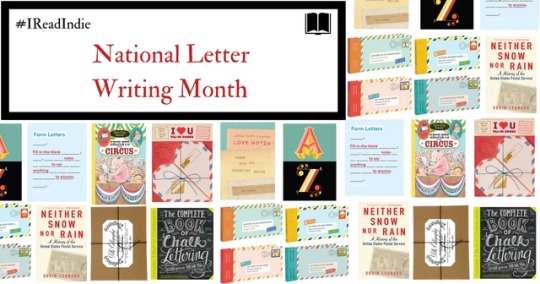
April is National Letter Writing Month, a celebration of snail mail and a way “to raise awareness of the importance and historical significance of card and letter writing.�� The latest #IReadIndie campaign is spotlighting books that pay tribute to the art of handwritten notes, the fascinating story of our country’s postal service, and those times when sending an email just won’t suffice.
National Letter Writing Month
Grove Atlantic
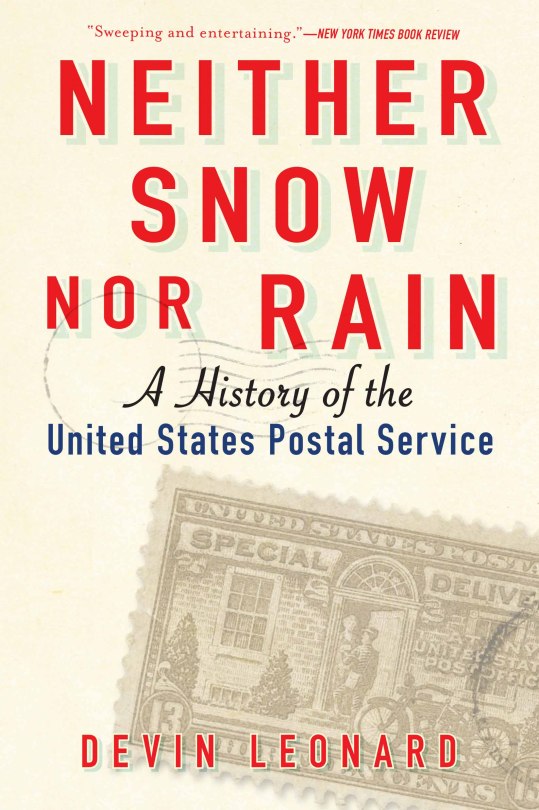
Neither Snow Nor Rain by Devin Leonard
The United States Postal Service is a wondrous American creation. Seven days a week, its army of 300,000 letter carriers delivers 513 million pieces of mail, 40 percent of the world’s volume. It’s far more efficient than any other mail service in the world, and it has a storied history. Founded by Benjamin Franklin, it was the information network that bound far-flung Americans together, fostering a common culture. A first-class stamp remains one of the greatest bargains of all time, yet the USPS is slowly vanishing. Neither Snow Nor Rain is a rich history, full of remarkable characters, from the stamp-collecting FDR, to the revolutionaries who challenged USPS’s monopoly on mail, to the renegade union members who brought the system—and the country—to a halt in the 1970s. An exciting, engrossing read, Neither Snow Nor Rain is the first major history of the USPS in over fifty years.
Buy Links:
IndieBound: https://goo.gl/SdNTDh
Barnes & Noble: https://goo.gl/R85RZj
Amazon: https://goo.gl/OHd8tu
Workman Publishing
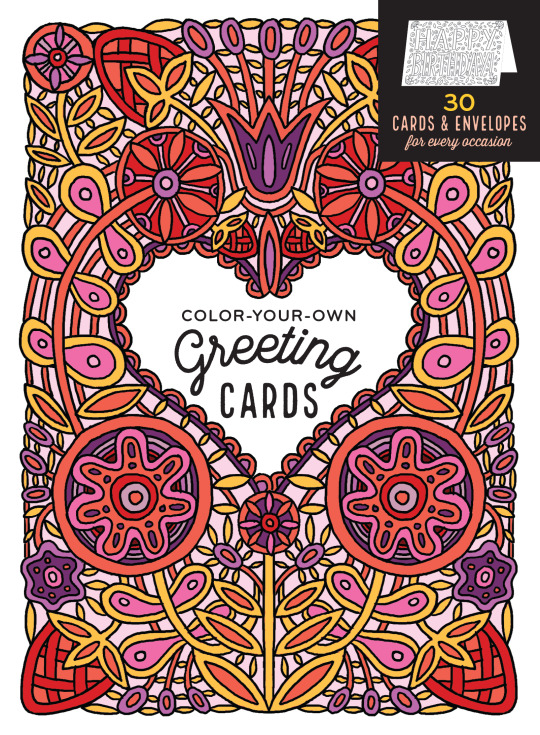
Color-Your-Own Greeting Cards by Caitlin Keegan
Offering a practical twist on the ever-popular coloring book, these 30 ready-to-color cards have images and hand-lettered messages for celebrations big and small throughout the year—including birthdays, weddings, anniversaries, welcoming a new baby, and offering congratulations and thanks—as well as more general all-purpose pictures. Accompanying ready-to-color envelopes mean the completed 5x7 cards will be ready for mailing.
Buy links:
Indiebound: https://goo.gl/1yOzW1
Barnes & Noble: https://goo.gl/8pPhul
Amazon: http://amzn.to/2oqq1MX
Workman: https://goo.gl/6HJLwe
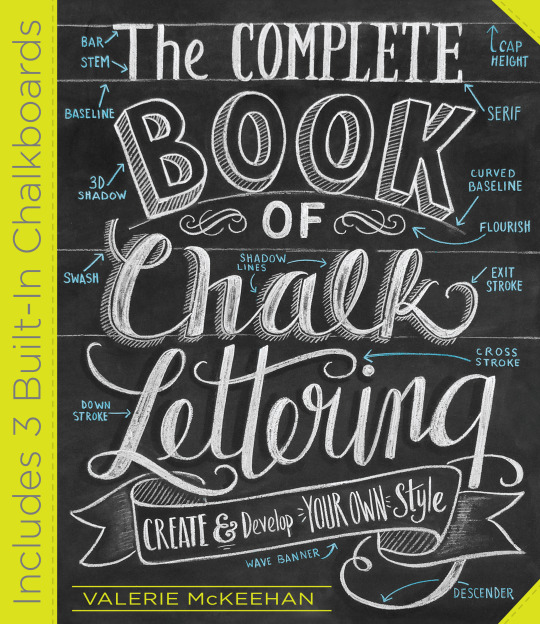
The Complete Book of Chalk Lettering by Valerie McKeehan
In over 60 lessons, with three foldout “chalkboards” for practice, learn the ABCs of lettering (literally) and basic styles: serif, sans serif, and script. Next, lay out a design, combine various styles into one cohesive piece, add shadows and dimension. Then master more advanced letter styles, from faceted to ribbon to “vintage circus.” It’s everything you need to know to create gorgeous hand-drawn designs.
Buy links:
Indiebound: https://goo.gl/GGzym1
Barnes & Noble: https://goo.gl/Ft5bbA
Amazon: http://amzn.to/2plRcWr
Workman: https://goo.gl/dlyDjA
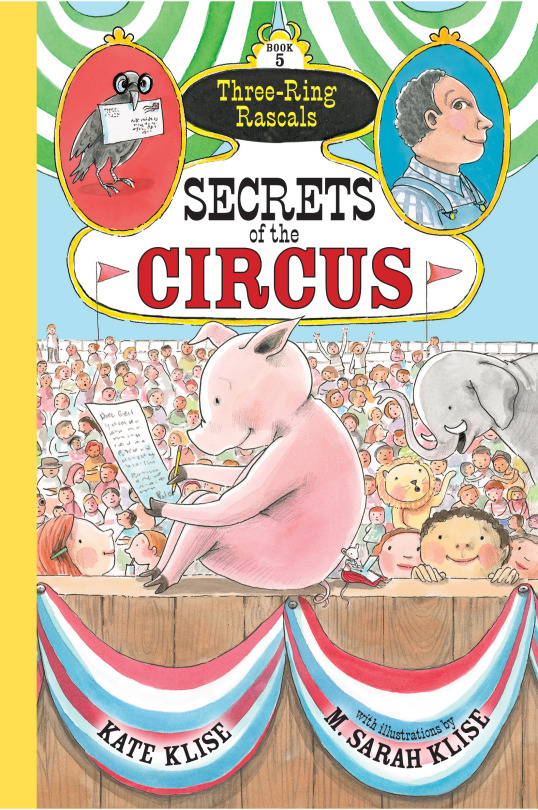
Secrets of the Circus by Kate Klise, illustrated by M. Sarah Klise
The members of the world’s friendliest circus must band together and save Gert’s secret pen pal—a pig named Pablo—in Secrets of the Circus, another zany adventure in the Three-Ring Rascals series. Download free stationery and start writing your own pen pal!
Buy links:
Indiebound: https://goo.gl/3F9GuZ
Barnes & Noble: https://goo.gl/CGtZ9d
Amazon: http://amzn.to/2nxGcsw
Workman: https://goo.gl/M2168k
ABRAMS Books
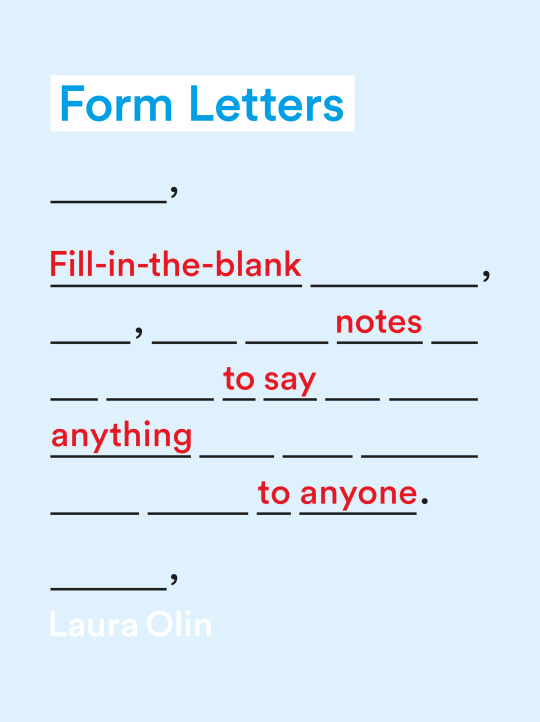
Form Letters by Laura Olin
Have you ever wanted to tell someone you’ve been desperately in love with them for years, or that you hate the sound of their voice, or that you’re really, really, REALLY sorry you threw up on them last night when you were drunk? Form Letters not only offers you a way to do so, but also makes it simple and irresistible. These letters let you privately reflect on all the things you wish you’d said. Or, you can tear the letters out and send them to their intended recipients. Either way, Form Letters offers cathartic, hilarious, and much-needed moments of self-reflection.
Buy Links:
IndieBound: http://bit.ly/2p4a2Si
Barnes & Noble: http://bit.ly/2p4a1Oe
Amazon: http://amzn.to/2p4nRQT
ABRAMS: http://bit.ly/2p42xuN
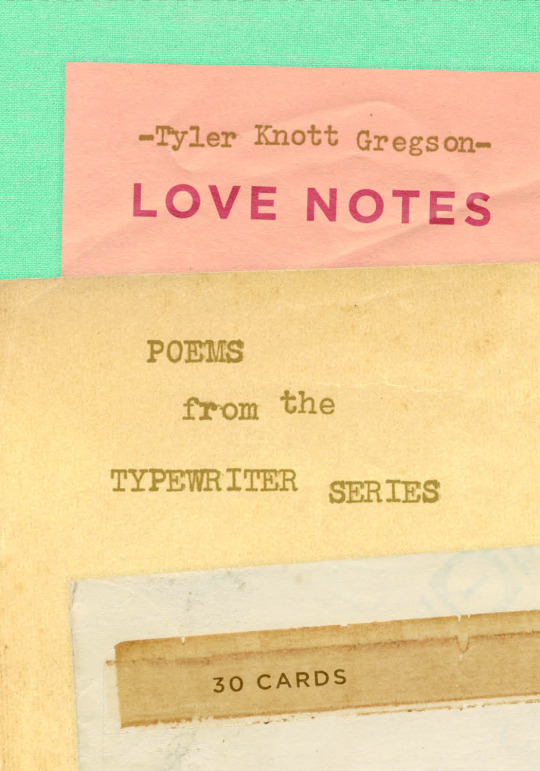
Love Notes: Poems from the Typewriter Series by Tyler Knott Gregson
From Tyler Knott Gregson, author of the national bestseller Chasers of the Light and creator of the Typewriter Series, this book contains 30 beautiful poetry cards devoted to love. Printed in full-color on heavy stock with gold edges, each card is a spontaneous romantic gesture waiting to happen. Include one with flowers and send another by mail. Place a card on a pillow, leave one by the morning coffee, and tuck another in a coat pocket for later discovery. Selected from Tyler’s most insightful pieces of work, this collection is filled with heartfelt, honest, and inspiring words from one of poetry’s most popular new voices.
Buy Links:
IndieBound: http://bit.ly/2p4jvcj
Barnes & Noble: http://bit.ly/2p4hmgM
Amazon: http://amzn.to/2p4bfJk
ABRAMS: http://bit.ly/2p4fcxW
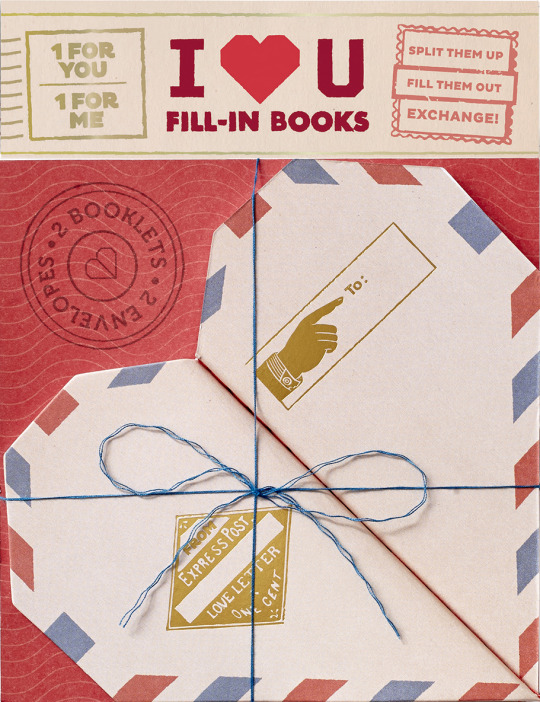
I Heart You: 2 Fill-In Books (1 for You, 1 for Me) by Abrams Noterie
Have a heartfelt exchange with your partner or best friend. These identical half-heart-shaped booklets contain fun and thoughtful prompts that invite you and someone special to share what you love best about each other. Fill out one booklet and give the other to a loved one to fill out for you. Then exchange the completed booklets and feel the love! The package comes with two envelopes for mailing or gifting.
Buy Links:
Barnes & Noble: http://bit.ly/2p4wLOq
Amazon: http://amzn.to/2p4mwcL
ABRAMS: http://bit.ly/2p4bILI
Chronicle Books
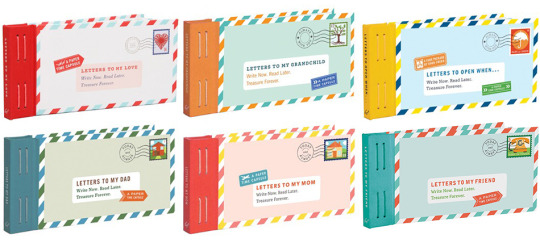
Letters to My… Series by Lea Redmond
At once a priceless memento and a journey forward in time, Lea Redmond’s Letters to My… series features innovative books of 12 fold-and-mail style letters, offering a unique way to capture the moment. The bound books include prompted letters to an important person in your life: your future self, your new baby, your grandchild, or your romantic partner. Each blank letter smartly folds out for ease of writing, seals up tightly, and then remains attached to the spine to be opened by the lucky recipient at some point in the future.
Chronicle Books: https://goo.gl/wizJn4
Barnes and Noble: https://goo.gl/gF3xhT
IndieBound: https://goo.gl/BDCxJy
Amazon: https://goo.gl/VNwUo6
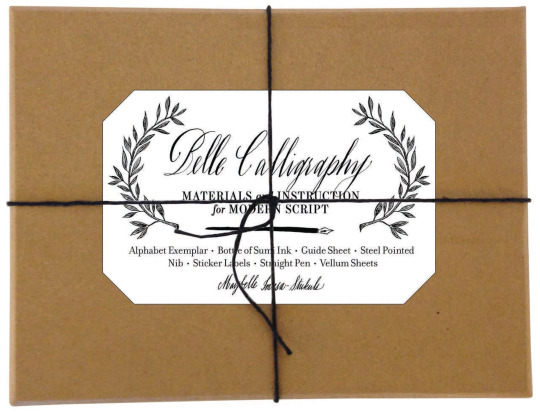
Belle Calligraphy Kit: Materials and Instruction for Modern Script by Maybelle Imasa-Stukuls
The covetable look of calligraphy is now well within reach for even the most novice practitioner. This ready-to-gift box—a brown paper package tied up with string—includes all the materials and technical guidance needed to learn calligraphy in a modern style that embraces the beauty of each person's unique penmanship. Illustrated project ideas show that script, easy as it is, makes everything irresistible.
Chronicle Books: https://goo.gl/5p6vZh
Barnes and Noble: https://goo.gl/npJ14D
IndieBound: https://goo.gl/8Qphht
Amazon: https://goo.gl/DrI3ty
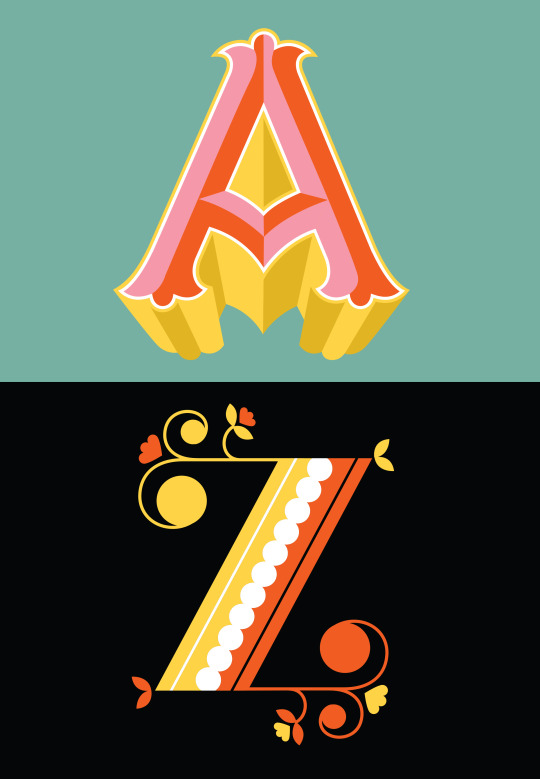
Drop Caps: 100 Postcards illustrated by Jessica Hische
An A to Z of good design, this alphabetically oriented set of 100 postcards features the best hand-drawn letters from Daily Drop Cap, Jessica Hische's popular typography website. Bright colors and highly illustrative letters make a uniquely personal impression in the mail or on display as miniature monograms.
Chronicle Books: https://goo.gl/V4wgV3
IndieBound: https://goo.gl/jn8JeS
Amazon: https://goo.gl/cR6qrl
2 notes
·
View notes
Text
RANDOM READS!
disclaimer: these are my opinions and thoughts, that means you can have your own opinion and feelings towards the book. may contain spoilers.

lately i haven’t found any books that catch my attention, so instead i’m going to look back on some that did.
Grasshopper Jungle by Andrew Smith
Synopsis:
In the small town of Ealing, Iowa, Austin and his best friend, Robby, have accidentally unleashed an unstoppable army. An army of horny, hungry, six-foot-tall praying mantises that only want to do two things.
review: i’m not sure how to describe this book.
it’s not what it seems. i randomly purchased this book mostly because it was in the LGBT section of Amazon and the reviews described the book as “shocking”. i wanted a shocking book.
you follow Austin, a horny teenager who’s dealing with sudden erections and his love for his girlfriend and his best friend Robby. but the book ventures so much more deeper than that. it picks apart the pieces of an underground history of their town and “super sperm”, with a mixture of religion and science.
like i said, there isn’t an easy way to explain this book. adam smith’s writing is captivating and using foreshadowing in such a clever way. a fact seemingly insignificant will become a larger part of the story.
the plot is somewhat confusing, i did have to read over some parts, and i’ll admit it does drag here in there, but the entirety of the book itself is golden. the writing, the characters, the dialog and plot are all uniquely placed together shoving you into this world and austin’s mind.
i can honestly say i’ve never read anything like this book. even if this genre isn’t your thing the writing alone is so interesting i recommend it to anyone who wants to pursue writing and needs inspiration. this book changed the way i write.
i’ll defintely reread this one again.
rating: 8/10
Lullabies by Lang Leav
Synopsis:
A sequel to the hugely popular, best-selling Love & Misadventure, Lullabies continues to explore the intricacies of love and loss.
Set to a musical theme, love's poetic journey in this new, original collection begins with a Duet and travels through Interlude and Finale with an Encore popular piece from the best-selling Love & Misadventure. Lang Leav's evocative poetry speaks to the soul of anyone who is on this journey.
Leav has an unnerving ability to see inside the hearts and minds of her readers. Her talent for translating complex emotions with astonishing simplicity has won her a cult following of devoted fans from all over the world.
Lang Leav is a poet and internationally exhibiting artist.
review: Lang Leav is one of the few of my favorites poets. her writing is so gorgeous and full of emotion. i’ve purchased every book she’s published and loved each one of them.
her slightly long pieces are my favorites as you get the taste of her story telling. the artwork is gorgeous and a complete add-on to her writing.
rating: 10/10
milk and honey by rupi kaur
Synopsis:
Milk and Honey is a collection of poetry and prose about survival. About the experience of violence, abuse, love, loss, and femininity.
The book is divided into four chapters, and each chapter serves a different purpose. Deals with a different pain. Heals a different heartache. Milk and Honey takes readers through a journey of the most bitter moments in life and finds sweetness in them because there is sweetness everywhere if you are just willing to look.
review: this book had been on my wish list for a while, and i was not disappointed. the collection of poems fit incredibly well together in a mixture of love, pain, sex and self esteem.
rupi kaur writes how it truly feels to be trapped in any emotion. she writes about the power and lose of sex, the feeling of being human and looking at human skin as flaws. she’s a brilliant writer. this book completely consumed me.
rating: 10/10
More Than This by Patrick Ness
Synopsis:
Seth drowns, desperate and alone. But then he wakes. Naked, thirsty, starving. But alive. And where is he? The street seems familiar, but everything is abandoned, overgrown, covered in dust. He remembers dying, his skull bashed against the rocks. Has he woken up in his own personal hell? Is there more to this life, or perhaps this afterlife? From the acclaimed author of the Chaos Walking trilogy and A Monster Calls comes one of the most provocative teen novels of our time.
review: again, this book was not what i expected. i was extremely intrigued by the summery. there’s not much i can say about the story without giving away the plot completely- which is so tempting.
the story is more than a boy who died and woke up. it holds a lot of questions about life and trauma, and choices people make in order to live with such trauma.
seth’s parents, and the rest of the world, chooses how to live with trauma and so when seth, regine and tomaz wake up in a world that isn’t there’s they unlock what the world’s become.
the story is filled with love and danger, and a lot of pain. patrick writes about pain and how it can change you. how lives can be stolen. that everyone has something they’re hiding from.
this book is an extremely wonderful read. but the ending is a true cliffhanger and still leaves me upset.
rating: 9/10
those are some random reads of mine. if you would like me to do another one feel free to rb or message me any time.
- Cath
#cath post#book review#Book Recommendations#grasshopper jungle#andrew smith#lullabies#lang leav#milk and honey#rupi kaur#more than this#patrick ness#blog#blog post
1 note
·
View note
Text
12 or 20 (small press) questions with Angelo Colavita on Empty Set Press
Empty Set Press publishes chapbooks of conceptual and experimental poetry by writers who challenge the functions of language, form, and imagery, producing work that is innovative, new, and exciting. Based in Philadelphia, ESP strives toward a synthesis of local authors, visual artists, print shops, and venues within the city’s thriving literary landscape to broaden the horizons of the greater artistic community as well as the community at large. Founding Editor of Empty Set Press, ANGELO COLAVITA lives and writes in Philadelphia, where he hosts Oxford Coma, a nihilist poetry reading series and serves as Poetry Editor for Limited Editions Quarterly Journal. His work has appeared in Apiary Magazine, The Philadelphia Citizen, Mad House, Rolling Thunder Quarterly, Be About It Zine, Outcast Poetry Journal and elsewhere online and in print. His first chapbook, HEROINes, was published in March 2017. 1 – When did Empty Set Press first start? How have your original goals as a publisher shifted since you started, if at all? And what have you learned through the process? I started Empty Set Press back in March. I was basically just following suggestions. After an extended absence from the poetry community, I started bouncing around, doing readings again. A few people asked where they could find more of my work. I’ve had a few pieces published in magazines here and there and online, but several people told me I should have a chapbook out. I was reluctant to self-publish, and to be honest, I was ready to move on from the stuff I was writing during the years I was MIA. But I figured, I might as well. It was sort of a ruse. I came up with the name and a logo and slapped it on the back of a collection that would become Empty Set’s first release: HEROINes. Pretty slick. In an effort to legitimize the whole thing, I filed for an LLC with student loan money and set up a website. I turned to Chris McCreary, who’d been running Ixnay Press in Philly for some advice on how to make my next move. He suggested I publish someone else as soon as I made my money back with the sales from HEROINes. So that’s what I did. The first person I thought to solicit was Maryan Captan. We were friends in the poetry scene for a while at this point and connected greatly on a creative level, so it made perfect sense. I’m really proud of Copy/Body. It’s a lovely and unnerving chapbook. So what started as a means of getting something out that I could potentially peddle at readings turned into something I could use to publish poets I loved that were kind of on the outer ring of the inner circle, so to speak. And there was room for it in the Philly scene, so why not? The chapbook is a vital part of publishing history, especially among poets. I go for work that is weird, dynamic, written by poets that aren’t going to shy from toying with form and language and a bleak aesthetic. One thing I’ve learned that I’d never considered is how helping someone bring their concept to life, give it flesh, would give me another creative outlet beside the writing itself, and still within the realm of poetry. 2 – What first brought you to publishing? As I mentioned before, what first brought me to publishing was the publication of HEROINes. But what’s keeping me going is so much greater than myself. I enjoy editing and layout, designing covers, booking readings… It’s more of a lifestyle, in my opinion. Every aspect of my day-to-day life revolves around writing, be it my own or my friends’ or anyone else’s. 3 – What do you consider the role and responsibilities, if any, of small publishing? Small publishers have this advantage of working intimately with their authors. Seeing their authors’ ideas through is what a small press is not only capable of, but also, responsible for. When I read something I love, or hear someone read that totally blows me away, I feel it’s my job to take that writing and put it in print in a way that highlights its personality with respect to the author’s voice. The aesthetic of the book is terribly important to me. It has to look and feel like the poetry sounds. The art on the cover has to speak on the words on the page. The fonts have to be cold if the writing is cold, delicate if the writing is delicate. The empty spaces are as much a part of the book as the poetry is, and should be treated as such, so the margins and linespacing need to reflect that. Then there is the promotion and everything at that end: launch parties, readings, etc. I try not to just book readings or events on my own as Empty Set, but also support local monthly reading series in the area as well. This is what I commit to when I publish a book. It’s a matter of fully integrating the poetry and the poet with artists and venues and a readership. I’m a midwife, so to speak. 4 – What do you see your press doing that no one else is? I love experimental poetry. Stuff I have to read several times over. Stuff I want to read several times over. I love collections that move from one poem to the next, that share some kind of symbiotic relationship. I like to be challenged. If there is one thing that will separate Empty Set Press from anyone else, is that you can count on being challenged intellectually, emotionally, aesthetically… It takes more than wearing your heart on your sleeve to write solid poetry. Use the form. Abuse the form. Get uncomfortable. Otherwise, why do it at all? 5 – What do you see as the most effective way to get new chapbooks out into the world? Right now, I’m just selling books through the website (emptysetpress.com) and at poetry readings. It’s not uncommon for me to carry chapbooks around with me in a backpack either. It’s keeping the press afloat for the time being, though, with everything in store for the press within the next few months, I’m going to have to make bigger moves. I’ll probably be setting something up with SPD (Small Press Distribution) for the next release, Maris McLamoureary’s DICTIONNAIRE INFERNAL by Chris McCreary & Mark Lamoureux (due out sometime this fall). This thing is gaining momentum faster than I ever expected it would and it’s already time to expand a bit. SPD can reach a wider audience than I can on my own. I want to avoid the whole Amazon thing. I feel that’s unnecessary. I’ll avoid chain stores and corporate bullshit at all costs. They’re unnecessary. This is a time when artists can have complete control over their output, marketing, and distribution, so there’s no need to rely on anyone else outside of our own communities. If I’m going to publish local, emerging writers, I’m going to use a local printer to print the damn things and in the near future, I’ll go through an independent distributor to get them out to people. But that’s in the near future. Right now I’m doing well on my own, with the support of the Philly arts and poetry community, and elsewhere through Empty Set’s website. 6 – How involved an editor are you? Do you dig deep into line edits, or do you prefer more of a light touch? I suppose that all depends on the content itself. I’ll read a manuscript many, many times over before I make any edits. This is after I have some kind of sit-down with the author. So far, the authors I’m publishing have been poets I’m quite familiar with already, so I have a fairly good understanding of their voice. But I also keep in mind the intent of their concept and the feel of each individual poem as much as I do the book as a whole. That said, I’ll run through once for punctuation and spelling issues, once for linespacing/layout purposes, try a few different fonts or font sizes, page breaks, stuff like that, cut what poems work with overall mood of the book, sequencing. By the time I send the file off to the printer, I’ll have gone over it about twenty times or so. That’s not an exaggeration. With Copy/Body, the biggest issue was really sequencing and uniformity when it came down to things like capitalization or caesurae. I’m now working on Cynthia Jones’ new chapbook, The World Sucks, But Some Things Don’t, and that’s a bit more involved. She’s a strong performance poet, so I’ve had to come up with more dynamic ways of presenting her work on the page that represent her delivery on stage. She handed me a pretty hefty manuscript and all of the poems fit nicely together, but I’ll have to push my own sentimentality aside in order to cut it down to a chapbook-length collection. With Maris McLamoureary’s DICTIONNAIRE INFERNAL, Chris and Mark put together a pretty solid manuscript. There wasn’t much for me to do aside from sequencing the poems and making their punctuation styles uniform -- for instance, Chris will use two spaces after a period, while Mark will use one. I can pretty much tell you which of the two make what kinds of typos. Mark whips out Middle English or some arcane 17th Century French words that traditionally will have four different spellings amid modern references to Star Wars or Dungeons & Dragons, so I’ve had to shoot him text messages while working on that manuscript to see what he prefers. And that’s one of the things I love most about that book. 7 – How do your books get distributed? What are your usual print runs? For the past two chaps, we’ve done a run of 125 each, for the first editions. For the Maris run, it’ll probably be more like 200, since there are two authors who live in two different states and therefore have twice as many readers. I use Fireball Printing, a local Philly print shop, to handle all the printing and assembly. They’ve done such amazing work and are so accommodating. They really go above and beyond and print a high-quality chapbook. As far as distribution goes, anyone can order through Empty Set’s website, emptysetpress.com. If any bulk or international orders come in, I ask that you shoot us an email, rather than the online shop. We ship through the US Post Office, so shipping charges on those kinds of orders vary. Makes the paperwork easier on both ends. One thing we’ll be doing starting with the Maris book is using SPD, which will make shipping internationally way more convenient and affordable. 8 – How many other people are involved with editing or production? Do you work with other editors, and if so, how effective do you find it? What are the benefits, drawbacks? Up to this point, I’ve been the only one editing and handling layout. The experience has been great, but as we get busier, I imagine I’ll be turning to other to help out with that. It’s been pretty easy keeping true to the author's’ voice and vision with a single editor. However, it’s definitely time consuming along with all of the other things I’ve got going on, communitywise. After Dictionnaire Infernal and The World Sucks…, I’m moving on to three more manuscripts from Patrick Blagrave, Phil Mittereder, and a book of short stories by Christine Jones. There is no shortage of poets and editors in Philadelphia, that’s for certain. 9– How has being an editor/publisher changed the way you think about your own writing? I’ve definitely been experimenting a lot with form lately. I’m interested in how the line interacts with the page -- how the page forces the line, how they transition from one to the next. Lately, I’ve been drawn to very minimalist poetry, with more blank white space than poem. So that is a recent development. On the other hand, I’m knee-deep in writing a series of Hexagram poems, which happen to be dense blocks of text between thick margins. One of the greatest pleasures in writing, for me, is experiencing the mode and form dictate the language of a piece of literature and how that manifests into the physical object of a book. 10– How do you approach the idea of publishing your own writing? Some, such as Gary Geddes when he still ran Cormorant, refused such, yet various Coach House Press’ editors had titles during their tenures as editors for the press, including Victor Coleman and bpNichol. What do you think of the arguments for or against, or do you see the whole question as irrelevant? HEROINes was published under Empty Set Press, but that was more or less just to get it off the ground. I may or may not do that again. With future manuscripts, I’ll shop those around. If I had my way, writers would all run presses and publish each other. Of course, it all depends on the manuscript, really. I’d probably consider it on a project-to-project basis. One can say there is a certain degree of vanity and narcissism in publishing your own work, but then again the same can be said to expect someone else to publish you; there is a sense of validation that comes along with it. I think a bit of narcissism is necessary in the business of any art, and if an artist can have complete creative control over their work, then by all means they should take it. But when it comes to community, which is vital to a life of poetry, I’d rather let someone else publish my work, if only to participate in broadening the foundation. More people benefit from that sort of relationship. So, to answer your question… I don’t know. It’s probably irrelevant. That question itself isn’t irrelevant; it should be asked and definitely explored. But any answer to it is probably irrelevant. 11– How do you see Empty Set Press evolving? Experimental poetry isn’t a style of writing. That’s a common misconception. It just means you are trying something new, seeing if it works and what you can do with it. There are writers of all styles who like to explore new ideas, so I’d like to work with writers from a variety of other scenes who are doing this sort of thing. I want to publish your harebrained hullabaloo. I want the results of your scientific research. Eventually, I’d like to publish some kind of anthology. Maybe move on to perfect-bound full-lengths. And touring. Touring is definitely in the cards for Empty Set. We’re only a few months old now, so it’s hard to say for certain, but I’d like to load up who I can into a van and take ESP on the road. There is also a plan in the works for a brick-and-mortar venue: kind of a flophouse where poets and artists can create, hang out and crash, which would double as a performance space. 12– What, as a publisher, are you most proud of accomplishing? What do you think people have overlooked about your publications? What is your biggest frustration? 13– Who were your early publishing models when starting out? Chris from Ixnay Press and Shanna Compton from Bloof Books were instrumental in helping ESP become a reality. I was really into early Soft Skull releases. I grew up reading New Directions paperbacks. I love what Dalkey Archive has been doing. Green Integer, too, and their formatting is ideal. 14– How does Empty Set Press work to engage with your immediate literary community, and community at large? What journals or presses do you see Empty Set Press in dialogue with? How important do you see those dialogues, those conversations? I book readings pretty often, and I try to attend as many other readings as possible. I mean, I love going to poetry readings, but it’s also a matter of being present and active in the community, talking to people, etc. Apiary Magazine is a Philadelphia institution. They’ve been very supportive of Empty Set Press from day one. In fact, the first short story I’ve ever had published was in Apiary back in 2009, and we’ve had a close relationship ever since. Mad House Magazine is another great publication. My buddy Phil Mittereder runs Mad House and we have similar creative philosophies regarding writing. He’s in the process now of putting together a new manuscript which will be published by Empty Set soon. It’s vital for a small press to have a good relationship with other presses, magazines, reading series… Especially in poetry. The tighter the community, the stronger everyone’s output is, on the whole. 15– Do you hold regular or occasional readings or launches? How important do you see public readings and other events? I’ll book readings pretty often, whether they’re strictly Empty Set Press, or not. There are also a million great monthly reading series in the area, so we try to jump on their bills, too. As far as launches go... Yes, every chapbook release gets a launch party. I’m trying to tailor the party to suit the book itself. For the Dictionnaire Infernal launch, we’re having it at The Strange & Unusual, a local oddities parlor, and the band God Root is going to play an acoustic set. There will also be several other poets reading and a few other surprises in store at that launch, which I won’t get into here. It is shrouded in mystery for the time being. 16– How do you utilize the internet, if at all, to further your goals? Like most businesses, we do almost everything through the internet. Communication, promotion, marketing, everything. It’s 2017 -- the internet is as real as the air we breathe. I’m pretty sure Empty Set would not be as far along as it is now without the internet. At least not as fast. 17– Do you take submissions? If so, what aren’t you looking for? Right now, I have several titles lined up waiting for editing and layout. So we’re not accepting any unsolicited manuscripts. At some point we’ll open up for submissions, though. I’m not interested in publishing any of the New Confessional stuff (it’s fine for what it’s worth, but there are plenty of presses that will publish that), I’m not interested in memoirs or your diary. I will never publish anything that might be described as Bukowski-esque. No bar-brawl war stories, misogyny, or other American vitriol. Absolutely no hate literature whatsoever. And no kitschy humor (you can submit that stuff to McSweeney’s, I’m sure they’ll give it a go). 18– Tell me about three of your most recent titles, and why they’re special. Maryan Captan’s Copy/Body was our second release, but I see it as our first. Maryan is like my sister, and her poetry never fails to terrify me in the most tender way possible. We worked really hard on this book together and I couldn’t be happier with how it turned out. It’s actually two collections in one that meet in the center of the book; one side is Copy, and the other is Body. They have their own individual identities, but they share a certain dialogue with each other that is certainly magical. In October, the pre-orders for Maris McLamoureary’s DICTIONNAIRE INFERNAL, will be available. I’m really excited for this book to come out. Once a year, Chris McCreary and Mark Lamoureux write a poem together every day for the month of April as “Maris”. This chapbook is a collection of 24 poems, each for a specific demon. I borrowed a few style cues from an old edition of Aleister Crowley’s Book of Wisdom or Folly, as well as other esoteric/occult texts, to design the layout. Tattoo artist Kyle Fitzpatrick designed a sigil for the cover based on pentacles from The Lesser Key of Solomon. The poetry itself is a fantastic barrage of language, every line propelling you forward. After that, I’m releasing Cynthia Jones’ debut collection The World Sucks, But Some Things Don’t. Cynthia is more of a slam poet, so I’m working on getting her poems down on the page in a way that speaks on her performance. The book is essentially about trauma, and it’s various forms, so the pages are all color coded as a sort of trigger warning. Like, if you’d rather not read poems about depression, skip the pink pages; if you want to avoid poems about suicide, skim past the blue pages… Sounds like an intense read, and it is, but the best thing about it is there is this thread of hope that runs throughout the entire manuscript, the rainbow of pages, because that’s really who she is and what she’s about. 12 or 20 (small press) questions; from macalester http://ift.tt/2yMt0Eo via http://ift.tt/2gNulE5
0 notes
Text
I’m happy to welcome author Yecheilyah Ysrayl to my blog.
#gallery-0-13 { margin: auto; } #gallery-0-13 .gallery-item { float: left; margin-top: 10px; text-align: center; width: 33%; } #gallery-0-13 img { border: 2px solid #cfcfcf; } #gallery-0-13 .gallery-caption { margin-left: 0; } /* see gallery_shortcode() in wp-includes/media.php */
Please tell us a little bit about yourself.
Thank you, Rachel, for having me. My name is Yecheilyah (pronounced e-see-lee-yah) Ysrayl known to most as EC. I’m a native of Chicago and have been writing since I was twelve years old. I’ve been publishing my work now for about ten years. I am passionate about black history which is funny because I was never a history buff in school. But I enjoy reading and learning about the history of my people. I love sitting at the knees of elders and hearing stories of life back before I existed. So naturally, I got into writing about us just the same. Toni Morrison said that if there’s a book that you want to read that hasn’t been written yet then you must write it and that’s exactly what I do, though not always consciously. Poetry also has my heart and I dabble in Sci-Fi as well so don’t be surprised if you see me releasing something about aliens in the future. I try not to be limited.
How long have you been writing for?
I’ve been writing since I was twelve years old, so about eighteen years now.
What is your writing process like?
I’ll admit, I don’t like this question. It always sounds a bit weird to me because I like to keep things simple which means I don’t have much of a process. I sit down and write. The end.
I do write in silence and I try to tune everything out as I am writing the first draft. I think writers must learn the art of ignoring people. Otherwise, it can be difficult to create anything of value as you’re worrying about what people say and what people think. You’ll be constantly changing to fit someone’s opinion or version of what should be. So, my process is to stay to myself until it’s time to get deep into those revisions where I’ll need the assistance of others.
Do you have a writing routine? If so, what’s a typical day like for you?
Awwue Rachel. Is this another “process” question? Lol. OK. Let’s see here. It really depends on what day we’re talking about but on average, I start my day with a good workout. I get up in the morning and I head to the fitness center and it’s the first thing that I do aside from morning prayers and coffee, of course. Working out really helps to get the juices flowing mentally, the energy pumping and I find I have more clarity afterward. This is important to me because I think we forsake the mind a lot and forget that it must be exercised just as much as anything else. After the workout, it depends on what’s on the calendar. I have this gigantic calendar I keep at my desk as well as notebooks and sticky notes as reminders of what needs to be done. Is there a book I need to finish taking notes on for a review? Is it researching I need to do for a scene? Is there something outside of writing that holds priority? When I sit up on the bed, before I even get up, I usually spend a few moments staring out into space thinking about what I need to do that day with such questions.
What motivates you to write?
I am inspired the most by the people I meet and the books that I read. I love a book that just has you looking at the cover after you’ve read it and wishing there was a movie being made about it so you can see how the characters look in real life, and if they are different from how you imagined them in your head. The kind of book that leaves your mouth hanging open because you can’t understand how to process the fact that this book is over. Like, this is literally it. Those kinds of books get my hype and I want to write a book that is just as engaging. I am also motivated by the people that I meet, lifting them up and inspiring them to aspire for greatness. For me writing does not come from a focus on writing but a focus on living. The desire to educate and motivate others is most inspiring for me.
What was the first thing you did when you found out your book was being published?
I jumped up and down and then ran next door to show my neighbors.
Are you currently working on anything new?
Currently, I am revising Revelation which is book two in The Nora White Story. I am also working on a short inspirational piece called BREATHE. One of the things I am passionate about is motivating others and so this book is something I hope to offer to writers who specifically struggle with stress and low self-esteem, pressure and that beast called doubt. It’s a short project I hope to have out by the close of this year. It won’t have a big launch or anything.
If you weren’t a writer, what would your career be?
An elementary school teacher, hands down. I have worked with children for most of my life. I started with small children at The Louisiana In-Home School Program. I did that for four years. Then my husband and I managed a center in Shreveport for inner-city youth among other things where we tutored children of all ages, from as young as three to as old as seventeen. I did that for another five years. If I wasn’t writing I would definitely be teaching in some capacity.
What is the easiest part of writing for you? What is the hardest part?
The easiest part of writing for me is when I sit down to write that first draft. Not easy as in I snap my fingers and there’s a book but easy in that it’s the most fun part to me when you sit down and you write the story for the first time. Most of what you write at first may not even make it to the book (there are lots of chapters that did not make it to the final copy of Renaissance!) but that’s not what you worry about right then and there so it makes it a most exciting time. On a more serious note, it’s also the time where I am most serious about not letting everyone in because although the first draft, this is also where I feel that I am writing most of my heart. And the heart is important because despite going through so many changes later, the heart can never change. If it’s there it can never change. It can never be edited or critiqued or omitted. Because if the heart is there, the manuscript has its heartbeat and can live. That said, the fun part is just writing and being me as I write.
The hardest part is everything else! Lol. It’s the revising of the novel and making sure the plot makes sense enough to consider actually publishing. It’s the hustle for reviews later and market, promote, and so on. That’s the most challenge part for me, everything after the first draft. It’s challenging because I’m a shy person and to sell books it’s not like you can really stand in the background. So, I find myself doing a lot of what I am not comfortable doing. I’m not complaining because that’s where the growth is, outside that comfort zone. It’s challenging though.
What’s one thing you learned through writing that you wish you knew before you started?
Oh, Rachel. You really trying to have your readers here all day now. To keep it brief, I really wish I knew more about dialogue tags, head-hopping, and interior formatting before I started.
What is your favorite book or genre? Is there a special book that made you realize you wanted to write?
My favorite book since sixth grade is Roll of Thunder Hear My Cry by Mildred D. Taylor. This book made me want to write Literary Fiction. Not just this book but all the others. Let the Circle Be Unbroken, The Road to Memphis. I mean, her collection was life for me as a girl and I still have Roll of Thunder on my bookshelf today. It’s a little beat up but I have it. I may just order the others for the sake of it. Native Son by Richard Wright also changed my life.
What advice do you have for aspiring writers?
Read a lot, write a lot, and stay disciplined. Reading will keep that fire in you to create stories of your own. Discipline will force you to write them. Inspiration is great. Motivation is cool, but these aren’t constant. They don’t last. No one feels inspired or motivated forever. But if you have discipline and endurance then you can force yourself to do what needs to be done consistently enough to achieve your goals.
Is there anything else you would like to share?
Thank you, Rachel, for taking the time out of your busy schedule to pencil me in. Thanks to everyone reading this for the likes and shares. And if anyone would be interested in learning more about me and my work, I would be humbled if you could sign-up for my email list HERE to keep in touch. Thanks again.
About the Author
Yecheilyah Ysrayl is an Independent Author, Blogger, Poet, and Book Reviewer and writes Historical Fiction / African American Literature and poetry. Renaissance: The Nora White Story (Book One) is her ninth work and is due for release Saturday, July 15, 2017. A native of Chicago, she now resides in Shreveport, LA with her husband where she writes and blogs full time.
Connect with Yecheilyah
Website | Amazon | Blog | Facebook | Twitter | Instagram | Goodreads | Linkedin
Buy Her Books
This slideshow requires JavaScript.
Between Slavery and Freedom
Beyond the Colored Line
The Road to Freedom – Joseph’s Story
Pearls Before Swine
Womanhood Don’t Begin in Menstrual Cycles (poetry)
From When I was a Black Girl (poetry)
Meet Yecheilyah Ysrayl, Author I'm happy to welcome author Yecheilyah Ysrayl to my blog. Please tell us a little bit about yourself.
#author interview#books#creative writing#Reading#Writing#yecheilyah ysrayl#yecheilyah ysrayl author interview
0 notes
Text
Hyperallergic: Going Crazy in New York and San Francisco: An Interview with Poet Julien Poirier
When I first read San Francisco-based poet Julien Poirier’s Out of Print, recently released via the City Lights Spotlight series, I was struck by way Poirier embraces that ephemeral, experiential unity we call a moment. In a poem like “Stage 4 Lung Cancer Won’t Wait,” we read: “Untenable / — that’s the word I’m after . but if you brings you / pleasure, my dear / I’m all for it — though we can’t afford to live / in this city / we can always gad about / in books / picked for portability.” What stands out here is Poirier’s willingness to flirt with hokiness while making a highly nuanced remark (not to say generalization) touching on the overwhelming fragility of existence. Elsewhere, in a poem titled “Investigation,” we read: “we’ll rot, nothing wrong with that, each of us / in a kind of private self-enclosed BIG BANG, the same for everything that lives.”
Reading these and the other poems that make up Out of Print what struck me was less the ostensive morbidity of Poirier’s images than the searing honesty underlying them. In his reflective unselfconsciousness, he seems to put on the bardic mantle of Walt Whitman, while deflating any pretence of immortality. Poirier is writing for the moment — so it was gratifying to capture another moment when I interviewed him at a little coffee shop on the Lower East Side. For the duration of time it took to drink a cup of coffee, we talked about writing, the importance of death for comedy, teaching poetry to kids, and the specter of literary posterity.
* * *
Jeffrey Grunthaner: Based on reading your work, it seems like you really enjoy writing.
Julien Poirier: Yeah, I do. Definitely.
JG: Do you build up poems from fragments? What’s your process like?
JP: Over the course of writing this book it certainly didn’t feel fragmented. When I was living in New York I was constructing poems more from other poems, doing cut-ups and experimenting with different ways of building up poems. But more recently it became more … the poems would just sort of come out, or not. I don’t think I spent more than a few minutes rewriting any of the poems in there.
JG: I feel like there’s an almost Whitman-like impetus behind your work. For example, at the beginning of “Investigation”:
A thousand poets are working together on this same great poem but they don’t know it yet, only you and I can make this obvious — and many of my favorites are alive to this compulsion though their practice demands a temporary, however longterm deflection of the obvious.
Is this sincere?
Julien Poirier (2015) (photo by Louise Paige)
JP: Well, the comic idea is to take something as far as possible, like rhetoric. So you start out with a hunch, you start following it and try to get out to the edge of that hunch.
JG: You have an interesting take on death in this book. Again, I almost trace it to a Whitman-like mode. There are two moments in here where you mention death that I thought were …
JP: No, there’s got to be more.
JG: Okay, so what’s your take on death?
JP: Not to lean too heavily on it, but it’s a comic subject. It’s the end point of any comedy. You arrive there; it’s the negation of the comedy, and it’s the driving force behind it. It’s the anxiety that you can turn around into something funny. The ultimate absurdity is our values and meanings and the reality of death. At some point I thought I was overdoing it. I was constantly talking about it.
JG: In this collection?
JP: In everything! I kept coming back to it and thought: everyone knows — I don’t have to constantly mention this. I mean there’s a graceful way of doing it that alerts people to the presence of that beauty: the great emulsifier of death. But it can become kind of a screeching underneath everything, too.
JG: Even in a poetic context?
JP: Yeah, I think so. Death is really the big inspiration. It’s the reveal. It shows you the absurdity that becomes the exhilarating thing to write about. If you’re talking about it, then it’s almost like showing the trick. Whether it’s maudlin, frightening or funny — you can beat it to death.
JG: In “The San Francisco Earthquake and Fire (an Episode)” you say:
When I die recycle me in Chinatown, I want to come back a Chinamen in a long silk gown, but fat as ever, fat as ever.
JP: Right. I was reading a lot about old San Francisco, and it’s written in the voice of an old mogul: a rich San Francisco character who ends up falling on hard times, sleeping under the newspapers he was in. The imagery was taken directly from the earthquake era, early 20th-century San Francisco: the insanity of the gold rush, the silver rush after that. The one hundred-dollar watermelon, the thousand-dollar plate of oysters, the insane wealth.
JG: San Francisco is kind of like that now, isn’t it?
JP: Underneath it all, that’s its skeleton. Boomtown. It’s a boomtown all over again.
JG: Why did you call the collection Out of Print?
JP: I was looking for a title that was looking to the future. I could have also called it Out of My Hands.
Julien Poirier, “Kenny’s New Life” (courtesy the artist)
JG: Is it part of being a poet that this stuff ends up out of print?
JP: Not for everyone, but I don’t think people have too much control over it. It’s strange. Probably Blake won’t go out of print now. But by the 19th century he was forgotten, except by two people. And then some of my favorite poets I only know because I accidentally came across their book in a friend’s house. Like John Thorpe, this great California poet. Even within the poetry world he’s not known. And there is no justice or reason for that.
JG: You read the other day [March 30] at Berl’s Poetry Shop in Brooklyn. How did that go?
JP: It was great. It was fun. But I was mostly singing. Everyone in the audience seems to enjoy singing. It seems to make people happy and it sort of creates —
JG: You sing?
JP: I’ve been doing these songs that I end up recording while I’m driving. I’m driving a lot. And if these songs get stuck in my mind, then I end up singing them. I’ve made albums, which are really just Soundclouds. And maybe I’ll make a lyric book of them and send it out to people.
JG: Do people sing along with you at those readings?
JP: They don’t, but it involves song, it involves people. It’s like during an earthquake: the vibrations liquefy the earth. So a song liquefies distance. You are exposed, but this way you let people in. And it’s very physical; you’re using your whole body.
JG: Can you see these poems [in Out of Print] as having a similar structure coming through them all? What would that be?
JP: Well, Garrett [Caples] is a brilliant editor. He chose pretty much every poem that I felt was an essential poem. That was the book that he made, and it’s only in retrospect that I can look and say these are similar in any way. It’s still very hard for me, except for the ones that were written in that two-year span [between 2013 and 2015].
JG: Were you writing daily at that point?
JP: Yeah, I was writing daily, but I felt like it wasn’t working. Even beyond the stuff you know doesn’t work, the stuff that I though was working wasn’t working. A poem has to have all of these unspoken levels in it. You can feel that when you read it. If it’s too emotionally simplified, it’s obvious, and it becomes bitter or sentimental or whatever. You can have bitterness and sentimentality in a poem (it can be wonderful and beautiful) but it has to be part of this world of other anchors and weights. And most of the poetry I was writing daily didn’t have that. I wasn’t able to get all of that in there. And you can’t really try to get it in there. All you can do is when you know it’s in there, know it’s happening, is just go with it. Because it only happens every so often.
JG: Has teaching children in any way informed these types of poems that you write?
JP: When I was teaching in New York I was at a low point. Half the time in writing I was lost and didn’t know what I was doing. But I could teach really well. I think inevitably it’s changed me, and I think hopefully it’s made the poetry very extroverted. The poetry I bring into class tends to be [extroverted] also, so maybe it’s my bias. I’m not personally into critique, a critical conceptual framework. I’m into this sort of “outering,” you know? And that must have to do with teaching.
Julien Poirier, “Mylanta” (courtesy the artist)
JG: You say you’re not into a conceptual framework or poetics, but I think a poetics of “outering,” of externalizing subjectivity, does emerge pretty clearly.
JP: In a way the book is line of defense against literary criticism, which has seeped into poetry. There are these poets that are sort of like Grover Norquist, who said that he didn’t want to destroy the government, but just wanted to make it small enough to drown in the bathtub. Poets that didn’t want to destroy poetry, but basically take everything out of it that’s any fun at all, so it’s emaciated. I feel the kind of poetry I like has been on the ropes for a while; people have said that stuff is irrelevant and bourgeois or whatever. In this book I wanted to poke fun at that, and make examples of poetry that could live in this place that people have said is irrelevant or not livable.
Julien Poirier’s Out of Print (2016) is published by City Lights and is available from Amazon and other online booksellers.
The post Going Crazy in New York and San Francisco: An Interview with Poet Julien Poirier appeared first on Hyperallergic.
from Hyperallergic http://ift.tt/2pm78bK via IFTTT
0 notes
Photo

We’re proud to be part of the independent publishing community, promoting titles that break the mold and push boundaries. In support of our fellow independents, we’d like to draw attention to big books from smaller publishers across the country. First up, we’re highlighting our best books—fiction, essays, poetry, children’s stories, science books, memoir, and more—that celebrate diversity and inclusion, give voice to marginalized communities, and encourage free thinking—books that dare to be different.
What are your favorite current reads from independent houses? Join in on the conversation by using #IReadIndie.
Celebrate Diversity
Grove Atlantic
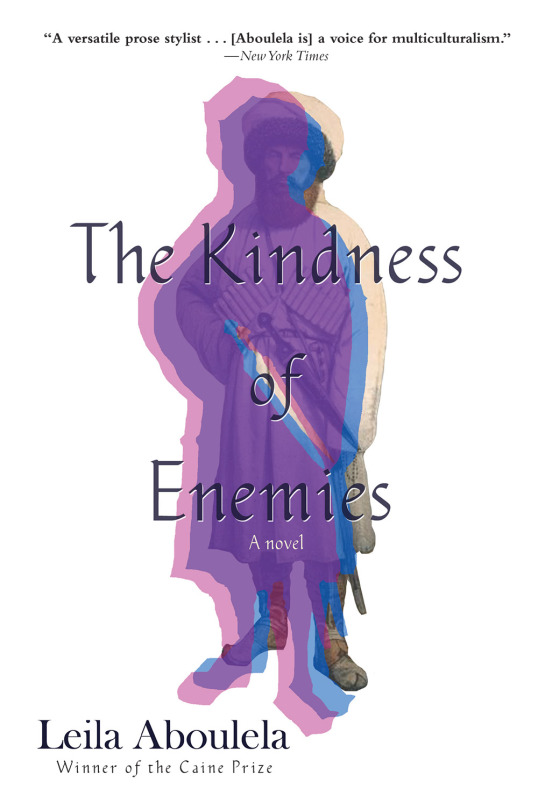
The Kindness of Enemies by Leila Aboulela
With citizens from seven predominantly Muslim countries recently banned from entering the United States, it is more important than ever to turn to and support those voices whose work unpacks history in order to provide clarity to the present. In her latest novel, Sudanese-born Leila Aboulela writes with inimitable elegance a multi-generational historical fiction saga about Imam Shamil, the 19th century Muslim leader who led the anti-Russian resistance in the Caucasian War; his family; and the reach of his legacy today. The Kindness of Enemies is both an engrossing story of a provocative period in history and an important examination of what it is to be a Muslim in a post-9/11 world.
Buy Links:
Indiebound: https://goo.gl/ZuSDhw
Amazon: https://goo.gl/gp6eBX
Barnes & Noble: https://goo.gl/F5waU7
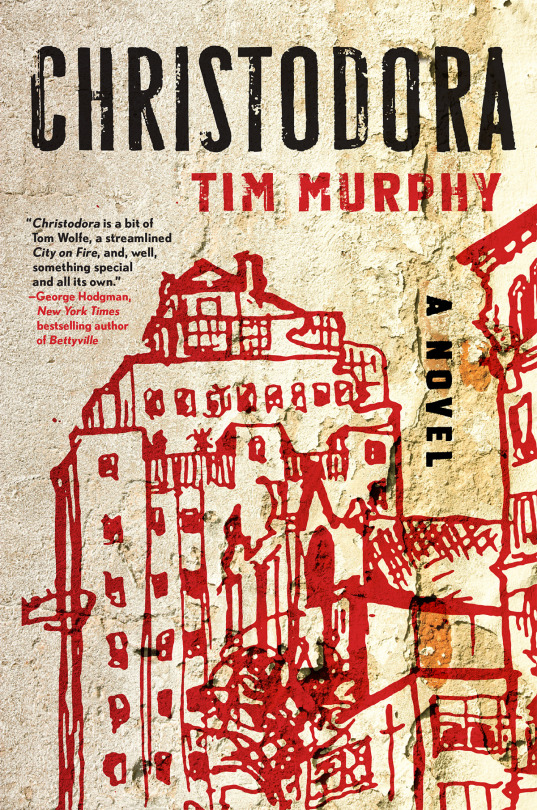
Christodora by Tim Murphy
In an age where queer people face hostility from a reactionary political establishment, the activism of the AIDS crisis offers urgent lessons as to how we can make positive change in the face of oppression and misinformation. A portrait of the endurance of love, the constellation of relationships that binds us, and the changing world of New York City, Christodora is a deeply moving portrait of a lost bohemian Manhattan and a powerful exploration of the fate of activists and artists in our contemporary society.
Buy Links:
Indiebound: https://goo.gl/0gWfIv
Amazon: https://goo.gl/DIInxN
Barnes & Noble: https://goo.gl/LRKkob

The Refugees by Viet Thanh Nguyen
The refugee experience is the world experience, and it is the American experience too—not least because of wars fought abroad that cause an influx of refugees at home. In his new collection, The Refugees, Viet Thanh Nguyen looks at the Vietnamese refugee experience in America, as well as the lives of some Americans in Vietnam. From the battles to build a good life in the wake of actual wars left behind, to new and old experiences of love and tenderness, and questions of where home is when hostility is faced both in the country of birth and the adopted country, The Refugees is a powerful and moving testament to the experiences of people living lives between two worlds.
Buy Links:
Indiebound: https://goo.gl/4aDzy5
Amazon: https://goo.gl/XCWGVy
Barnes & Noble: https://goo.gl/GypWIV
Workman Publishing
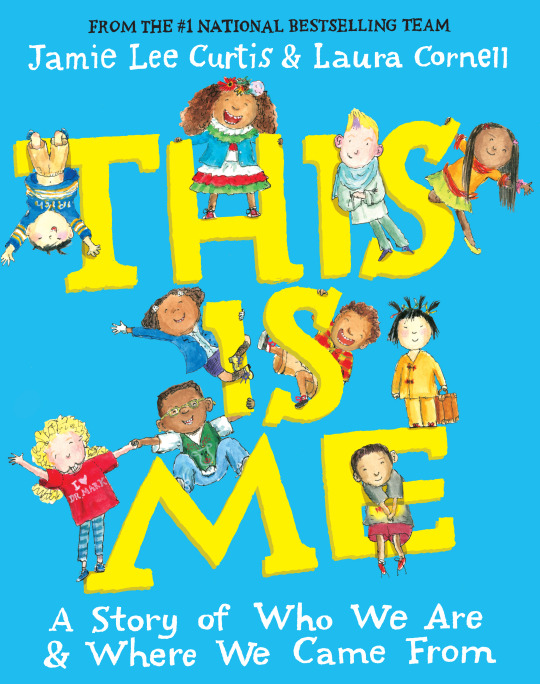
This is Me: A Story of Who We Are and Where We Came From by Jamie Lee Curtis and Laura Cornell
From the #1 New York Times bestselling creative team comes a timely, interactive picture book about immigration and identity. It asks children to consider: What would you pack if you had to travel to a new country with just a small suitcase? What are the things you love best? What says “This is me!”
Buy links:
Indiebound: https://goo.gl/WOczqq
Amazon: http://amzn.to/2kLnSug
Barnes & Noble: https://goo.gl/uGwzHW
Workman: https://goo.gl/ZrBBhr

In the Company of Women: Inspiration and Advice from over 100 Makers, Artists, and Entrepreneurs by Grace Bonney
Across the globe, women are embracing the entrepreneurial spirit and starting creative businesses. In the Company of Women profiles over 100 of these influential and creative women from all ages, races, backgrounds, and industries, and details the keys to their success.
Buy links:
Indiebound: https://goo.gl/Wb3yjd
Amazon: http://amzn.to/2jLPwFr
Barnes & Noble: https://goo.gl/cOK9mi
Workman: https://goo.gl/ufnLJR
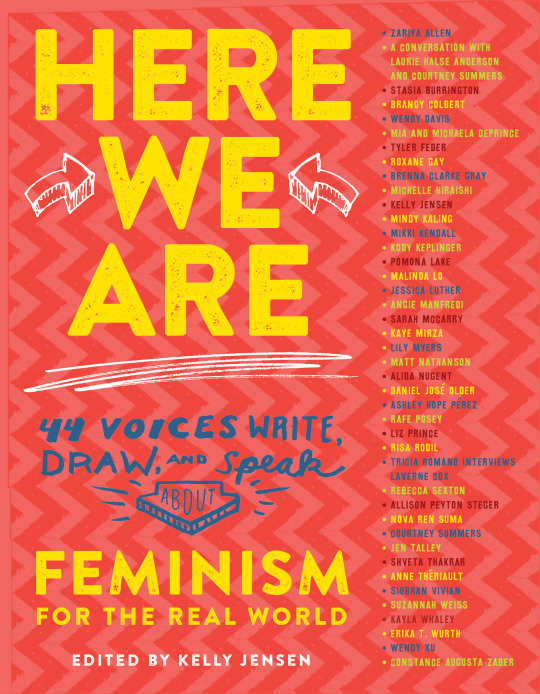
Here We Are: Feminism for the Real World edited by Kelly Jensen
Forty-four writers, dancers, actors, and artists contribute essays, lists, poems, comics, and illustrations about everything from body positivity to romance to gender identity to intersectionality to the greatest girl friendships in fiction. Together, they share diverse perspectives on and insights into what feminism means and what it looks like.
Buy links:
Indiebound: https://goo.gl/w8guFS
Amazon: http://amzn.to/2jOxfFg
Barnes & Noble: https://goo.gl/aZkg5w
Workman: https://goo.gl/yd8XsD
Sourcebooks, Inc.

The Radium Girls: The Dark Story of America’s Shining Women by Kate Moore
As World War I raged across the globe, hundreds of young women toiled away at the radium-dial factories, where they painted clock faces with a mysterious new substance called radium. With such a coveted job, these “shining girls” were considered the luckiest alive—until they began to fall mysteriously ill. The Radium Girls is the first book that fully explores the strength of these extraordinary women in the face of almost impossible circumstances and the astonishing legacy they left behind.
Buy Links:
Indiebound: https://goo.gl/JAQ5A0
Amazon: https://goo.gl/IdsGop
Barnes & Noble: https://goo.gl/CkCN9d

Isabella: Girl in Charge by Jennifer Fosberry (author) and Mike Litwin (illustrator)
Isabella: Girl in Charge explores some of the amazing women who made political history. This heartwarming tale empowers young girls to realize their true capabilities while inspiring them to let their own personalities shine.
Buy Links:
Indiebound: https://goo.gl/kBrJr0
Amazon: https://goo.gl/YvvloJ
Barnes & Noble: https://goo.gl/cYzH5k
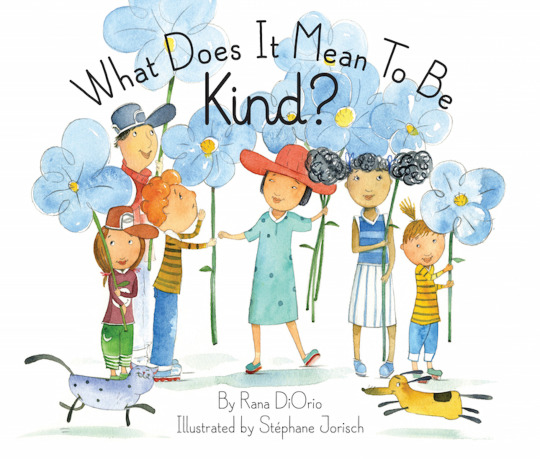
What Does it Mean to Be Kind? By Rana DiOrio (author) and Stéphane Jorisch (illustrator)
Part of the award-winning What Does It Mean to Be…? series, What Does It Mean to Be Kind? is a straightforward, accessible introduction to the idea of kindness, with suggestions that foster empathy and enlighten the world. What Does It Mean to Be Kind? shows young children how easy it is to be kind, through small acts and in simple ways.
Buy Links:
Indiebound: https://goo.gl/XLGWrm
Amazon: https://goo.gl/Zcr4ol
Barnes & Noble: https://goo.gl/2vDb4r
Feminist Press

Celebrate People’s History by Josh MacPhee
Celebrate People's History! features posters by over eighty artists that pay tribute to revolution, racial justice, women's rights, queer liberation, labor struggles, and creative activism and organizing. These essential movements—acts of resistance and great events in an often hidden history of civil rights struggles—remind us of the resilience of humankind even at the darkest of moments.
Buy Links:
Indiebound: goo.gl/GVu8Eh
Amazon: goo.gl/jcq2pg
Barnes & Noble: goo.gl/QOTT03
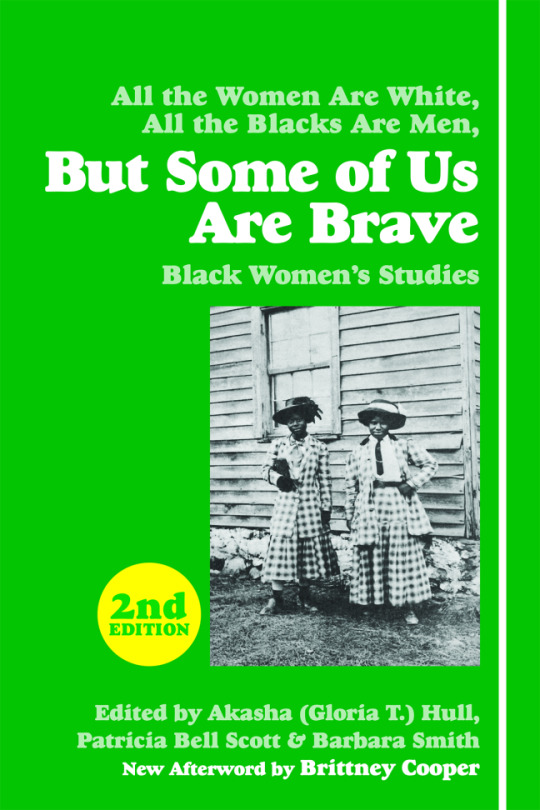
But Some of Us Are Brave (2nd Edition) By Gloria T. Hull, Patricia Bell Scott, and Barbara Smith
A precursor to Women’s March organizer Linda Sarsour’s statement “if you’re not following a woman of color, you’re in the wrong movement,” All the Women Are White, All the Blacks Are Men, But Some of Us Are Brave: Black Women's Studies is the first-ever comprehensive collection of black feminist scholarship. Featuring essays by Alice Walker, the Combahee River Collective, and Barbara Smith, and original resources, this book is vital to today's conversation on race and gender in America.
Buy Links:
Indiebound: goo.gl/cjNCwe
Amazon: goo.gl/nJ9frM
Barnes & Noble: goo.gl/dF8KWZ
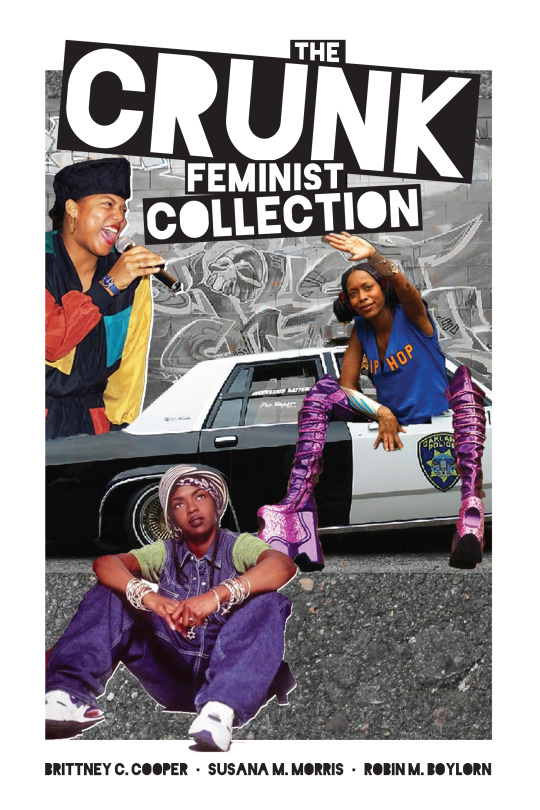
The Crunk Feminist Collection by Brittney C. Cooper, Susana M. Morris, and Robin M. Boylorn
For the Crunk Feminist Collective, their academic day jobs were lacking in conversations they actually wanted to have—relevant, real conversations about how race and gender politics intersect with pop culture and current events. To address this void, they started a blog. Now with an annual readership of nearly one million, their posts foster dialogue about activist methods, intersectionality, and sisterhood. Never afraid to speak out, disrupt narratives, and prioritize self-care, the Crunk editors are the models we need for activism in 2017.
Buy Links:
Indiebound: goo.gl/yFw61u
Amazon: goo.gl/XK6Dfy
Barnes & Noble: goo.gl/pPntQd
Milkweed Editions
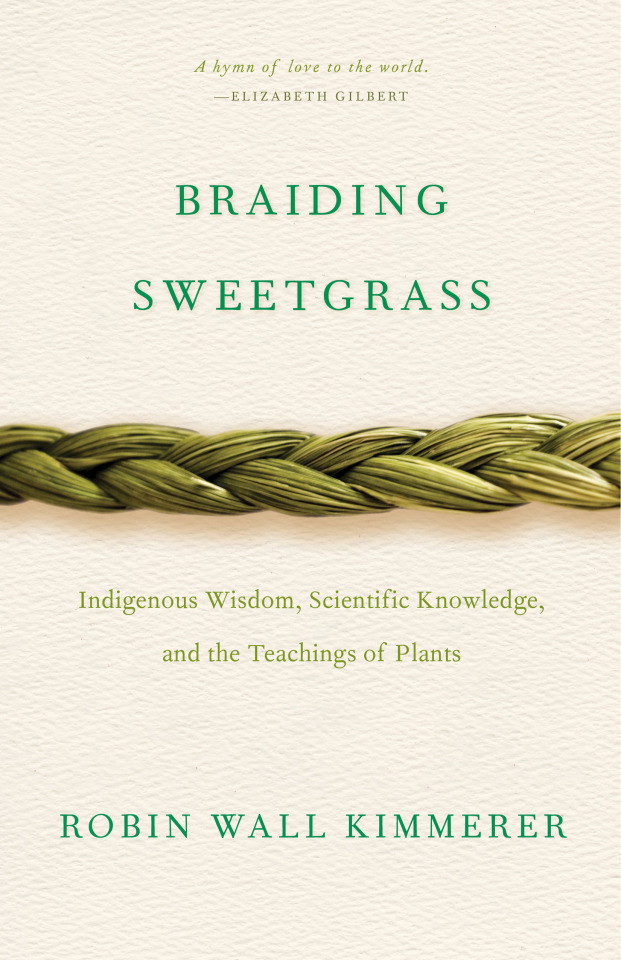
Braiding Sweetgrass: Indigenous Wisdom, Scientific Knowledge and the Teachings of Plants by Robin Wall Kimmerer
“A hymn of love to the world.” —Elizabeth Gilbert
As a botanist, the author has been trained to examine nature with the tools of science; as a member of the Citizen Potawatomi Nation, she embraces the notion that plants and animals are our teachers. Here she brings these two lenses together, showing how other living beings offer us gifts and lessons, even if we’ve forgotten how to hear their voices.
Buy Links:
Indiebound: https://goo.gl/WRoRgM
Amazon: https://goo.gl/lhl6eP
Barnes & Noble: https://goo.gl/TAQDX9
Milkweed: https://goo.gl/sqqg1E
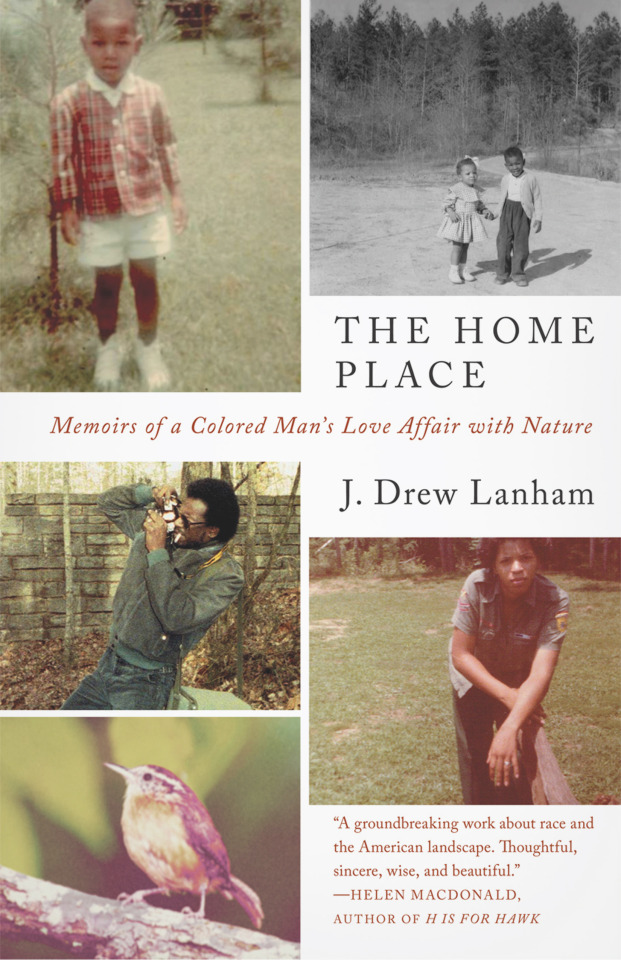
The Home Place: Memoirs of a Colored Man’s Love Affair with Nature by J. Drew Lanham
Growing up on his family’s land in South Carolina, J. Drew Lanham fell in love with the subtle beauties of the natural world around him—and grew up to be one of the lone black men in a predominantly white field. This memoir is a riveting exploration of the contradictions of black identity in the rural South, asking what it means to be “the rare bird, the oddity.”
Buy Links:
Indiebound: https://goo.gl/uOFCI4
Amazon: https://goo.gl/yV4udn
Barnes & Noble: https://goo.gl/UpxnMy
Milkweed: https://goo.gl/rEtPnV

Tula: Poems by Chris Santiago
Tula: a ruined Toltec capital; a Russian city known for its accordions; Tagalog for “poem.” Inspired by the experiences of the second-generation immigrant who does not fully acquire the language of his parents, the winner of the 2016 Lindquist & Vennum Prize for Poetry paints the portrait of a mythic homeland that is part ghostly underworld, part unknowable paradise.
Buy Links:
Indiebound: https://goo.gl/wQzYuY
Amazon: https://goo.gl/grTywe
Barnes & Noble: https://goo.gl/qsUiel
Milkweed: https://goo.gl/XfeFHr
Abrams Books
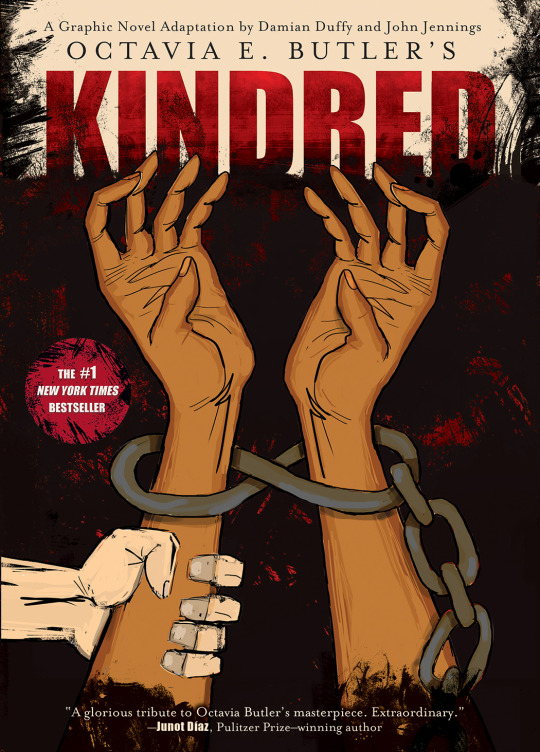
Kindred: A Graphic Novel Adaptation by Octavia Butler; Adapted by Damian Duffy and illustrated by John Jennings
More than 35 years after its release, Kindred continues to draw in new readers with its deep exploration of the violence and loss of humanity caused by slavery in the United States, and its complex and lasting impact on the present day. Adapted by celebrated academics and comics artists Damian Duffy and John Jennings, this graphic novel powerfully renders Butler’s mysterious and moving story, which spans racial and gender divides in the antebellum South through the 20th century.
Buy Links:
IndieBound: http://bit.ly/2kT3Iv4
ABRAMS: http://bit.ly/2kTbrcr
Amazon: http://amzn.to/2kTf0iT
B&N: http://bit.ly/2kT8dpm

Power to the People: The World of the Black Panthers by Bobby Seale; photographer Stephen Shames
Admired, reviled, emulated, misunderstood, the Black Panther Party was one of the most creative and influential responses to racism and inequality in American history. They advocated armed self-defense to counter police brutality, and initiated a program of patrolling the police with shotguns—and law books. Published on the 50th anniversary of the party’s founding, Power to the People is the in-depth chronicle of the only radical political party in America to make a difference in the struggle for civil rights.
Buy Links:
IndieBound: http://bit.ly/2kTclFL
ABRAMS: http://bit.ly/2kTfo11
Amazon: http://amzn.to/2kT8E3b
B&N: http://bit.ly/2kSY5gi

The Best I Could Do: An Illustrated Memoir by Thi Bui
This beautifully illustrated and emotional story is an evocative memoir about the search for a better future and a longing for the past. Exploring the anguish of immigration and the lasting effects that displacement has on a child and her family, debut author Thi Bui documents the story of her family’s daring escape after the fall of South Vietnam in the 1970s, and the difficulties they faced building new lives for themselves.
Buy Links:
IndieBound: http://bit.ly/2kTfeXt
ABRAMS: http://bit.ly/2kT0M1y
Amazon: http://amzn.to/2kT71SW
B&N: http://bit.ly/2kTa8Kw
Chronicle Books
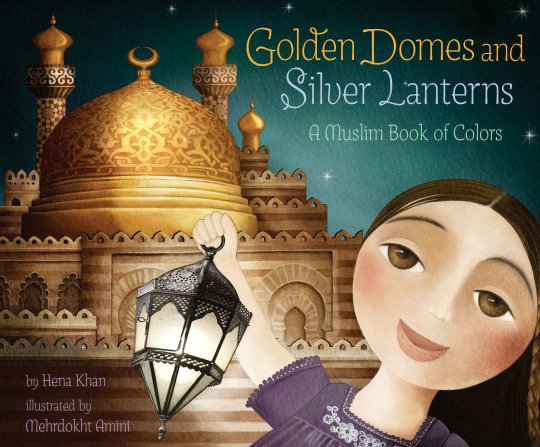
Golden Domes and Silver Lanterns: A Muslim Book of Colors by Hena Khan, illustrated by Mehrdokht Amini
Magnificently capturing the colorful world of Islam for the youngest readers, this breathtaking and informative picture book celebrates Islam’s beauty and traditions. From a red prayer rug to a blue hijab, everyday colors are given special meaning as young readers learn about clothing, food, and other important elements of Islamic culture, with a young Muslim girl as a guide.
Buy Links:
Indiebound: https://goo.gl/hz8CiN
Chronicle Books: http://ss1.us/a/XVNvTje3
Amazon: http://amzn.to/2kOJp4Z
Barnes & Noble: https://goo.gl/11nzG2
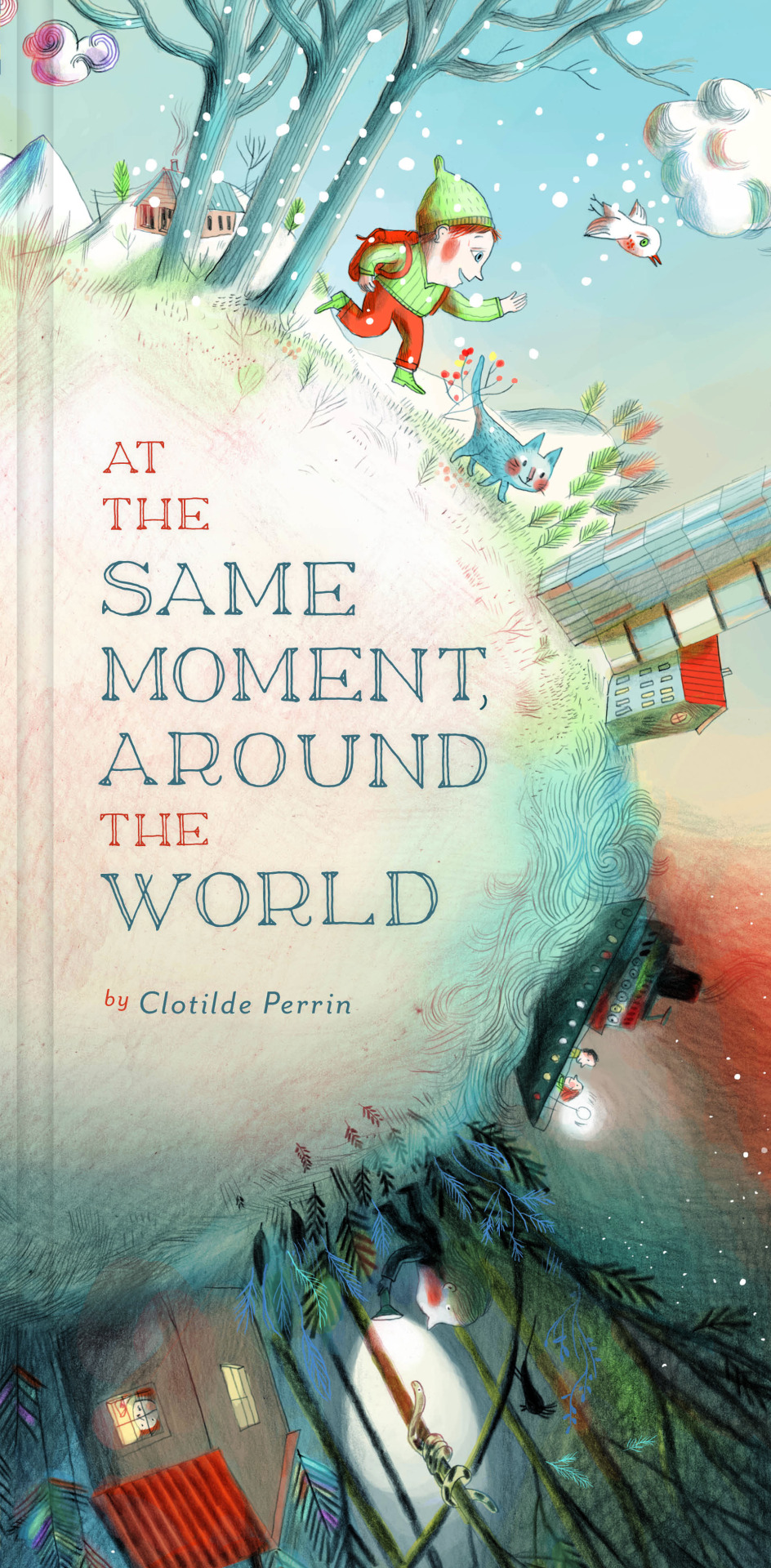
At the Same Moment, Around the World by Clotilde Perrin
Clotilde Perrin takes readers eastward from the Greenwich meridian, from day to night, with each page portraying one of (the original) 24 time zones. Discover Benedict drinking hot chocolate in Paris, France; Mitko chasing the school bus in Sofia, Bulgaria; and Khanh having a little nap in Hanoi, Vietnam. Strong back matter empowers readers to learn about the history of timekeeping and time zones, and to explore where each of the characters lives on the world map.
Buy Links:
Indiebound: https://goo.gl/j07B4d
Chronicle Books: http://ss1.us/a/rdbTsers
Amazon: http://amzn.to/2jRTgTO
Barnes & Noble: https://goo.gl/329S6H
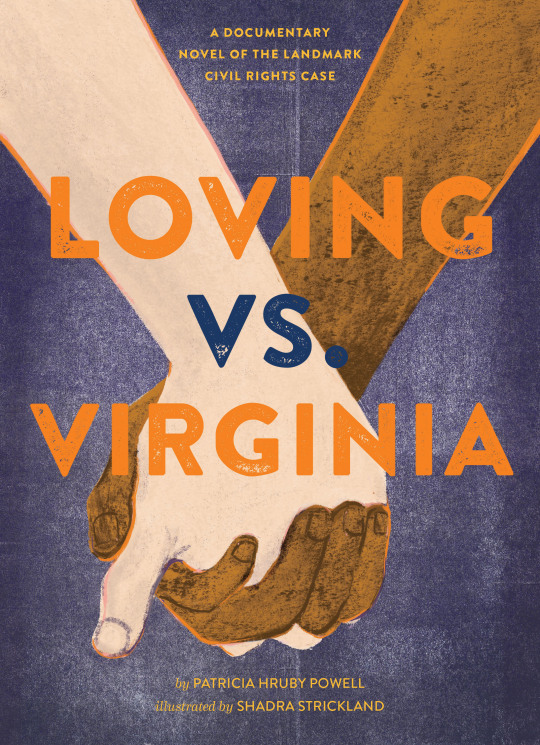
Loving vs. Virginia: A Documentary Novel of the Landmark Civil Rights Case by Patricia Hruby Powell, Illustrated by Shadra Strickland
From acclaimed author Patricia Hruby Powell comes the story of a landmark civil rights case, told in spare and gorgeous verse. In 1955, in Caroline County, Virginia, amidst segregation and prejudice, injustice and cruelty, two teenagers fell in love. Their life together broke the law, but their determination would change it. Richard and Mildred Loving were at the heart of a Supreme Court case that legalized marriage between races, and a story of the devoted couple who faced discrimination, fought it, and won.
Buy Links:
Indiebound: https://goo.gl/96Gupl
Chronicle Books: http://ss1.us/a/ICBp0PDQ
Amazon: http://amzn.to/2kOIS3a
Barnes & Noble: https://goo.gl/98Zbp8
7 notes
·
View notes